#this always happens in shows where the protagonist becomes somebody to be feared
Text
every single episode of attack on titan season 4 is basically saying in bright flashing neon letters ‘do not demonise people who seem different to you. you are the same in all the ways that matter. painting others as evil only leads to senseless violence, which causes more violence in turn until you are trapped in an endless cycle of it’ and yet somehow all the crunchyroll comments are full of people like ‘eren did nothing wrong’ ‘i hope someone kills gabi’ ‘marleyans deserve to die because they struck first’ like oh my godd oh my god oh my fucking god. did the wind part your hair when the point sailed over your head
#attack on titan#attack on titan season 4#attack on titan fans and breaking bad fans fighting over who can miss the themes of the show the hardest#this always happens in shows where the protagonist becomes somebody to be feared#and just like walt#eren's personality is seeded from very early on#if you look back you can ABSOLUTELY see it coming#he doesn't change so much as the context changes and other people start getting hurt because of them#eren is striving towards titan genocide in the final season but like. that is quite literally what he has always strived for#right back in like episode 2 he was vowing to kill every last titan#his approach has changed somewhat but he still fundamentally believes that killing is the answer#that's been consistent all through the show#but the audience's perspective changes because we learn more about what titans are. about how eren and everybody else is an eldian#blows my mind that people can look at gabi who basically IS EREN. she IS EREN and it is NOT subtle at all#and be like 'damn I hate that girl I want her dead'#she is eren as he was ten years ago watching his hometown and family destroyed#and she is raging with blind hate just like eren was#the problem with this show is people think you're supposed to pick a side. but you aren't#basically nobody in this whole series a good person and /that is the point/#it's so hard to BE a good person when you are trapped in a cycle of violence
7 notes
·
View notes
Text
While the prophecy in E46 is certainly not unequivocal and its wording can lead to many interpretations, I feel the show pointed that it was, ultimately, about Hürrem in the most ways.
Firstly, we have strong hints by the direction of the scene itself. When the fortuneteller says both "But there's a dragon living in the palace" and "The fish in the water will turn into a dragon with time", the camera zooms in on Hürrem. With the first line, it zooms in only on her before the next one comes. With the second line, the direction is still fixed on Hürrem until the fortuneteller mentions death.
Something similar occurs when the "There's death here" quote is uttered and right before the old woman starts fainting. We once again see only Hürrem's expressions prior to what happens next in both cases.
Hürrem's expressions are consistently shown before any reaction of the other people in the room. They're consistently more focused on. Right, this may be a coincidence: it could be just a part of the shock everyone was experiencing in the moment. And if Hürrem's reactions are a bit more focused on, it could be because she is the main protagonist; it would be a given for her reactions to it all to get more attention than the rest, in case they do. Right?
Then why does the fortuneteller seemingly shift her gaze at somebody at the end of her prophecy and the camera zooms right in on Hürrem again? This juxtaposition shot gets quite a bit of emphasis by the direction compared to everything else. It's not some insignificant "blink and you'll miss it" wonder, it's allowed to sink in for a little more before the prophecy is officially over. And I don't think that's accidental.
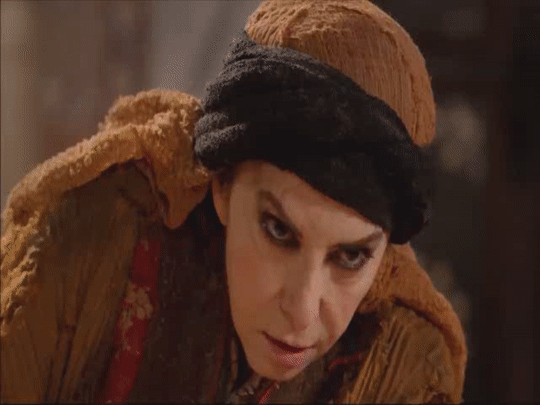
Secondly, Hürrem had a dream related to a dragon that burns ("overcomes") the enemy(-ies) in the next episode. That could very well be the same dragon the prophecy was referring to. That was the only time a dragon appeared in the series, the only time the prophecy was close to being called back to. And Hürrem's the only character who is somehow associated with a dragon, be it in a dream or anywhere else.
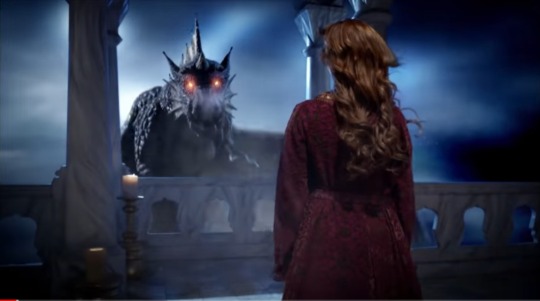
The dragon in the dream has to be connected to the dragon of the prophecy. Well, maybe it couldn't represent Hürrem since it appeared right in front of her and it didn't burn anyone around her in the dream, she herself was consumed by the flames. But again, what was related to the dragon of the prophecy? The end of the enemies. What is (especially S04) Hürrem's fatal flaw that "consumed her" to the point she thought her battle would be over after Mustafa's death and didn't pay so much attention to Selim and Bayezid's growing conflict? Her fixation on her enemies. The dream showcased Hürrem's fears most of all, but I'd argue these fears also play their part in triggering that fatal flaw. {The ambition of "defeating your enemies" is most explicitly attached to Hürrem out of all the characters. This is what her central goal is first and foremost and it seems to be the central goal of the dragon of the prophecy, too. Hürrem set out to overcome her enemies "one by one", just like the dragon eventually would. She's reminding herself of that objective as much as she's reminded of it by others - that's always an ongoing trend in her character arc.}
[In addition, the dream with the dragon delves into one of Hürrem's enormous inner vulnerabilities: the everlasting fear of her enemies getting hold on her permanently in a time where she's alone, with no one beside her. All this fits perfectly within the context of E47 where this precise sense of (understandable) panic and paranoia, the feeling that her own safety could be targeted in a time of a campaign because it's always happened before in some way, didn't only become a main theme of the episode... it became true, all her agitations turned out to be retroactively justified. Hence the symbolism of the dragon could be applied "in reverse" here: the harem riot Valide caused was "all over the castle", Hürrem was attacked with fire in order to be eliminated, but then she became stronger and slowly but surely made moves to strike back, along with fulfilling her own goal. Hürrem lives by a strong survival instinct: only one party goes down, it's either her or her enemies. She is aware of the likeability of her being the one to be taken down, the possibility of her enemies "burning" her, destroying her, the possibility of them "becoming the dragon" is always there, so she's the one who "becomes the dragon" instead. Hürrem turns into a dragon with time both overall and in the context of the post-E47 events in order to win the game, in order not to lose to them.]
Thirdly, Hürrem is infamously related to the fire element. She's the character with the most direct connection to fire. The dragon of the prophecy is a fire creature and it's precisely fire it uses to achieve its goals, which Hürrem also points to in her E63 monologue: she'll "rain as fire" over her enemies. (while this doesn't point exactly to the dragon, there is a connection nonetheless.)
Fourthly, the "fish in the sea" line doesn't have to be taken literally: perhaps it doesn't mean "one isn't an established power at all (until a later point in time)". The dragon is said to still be dormant, not necessarily powerless. The fortuneteller mentioned the dragon living in the palace before she went on with the "different form" and "fish in the sea" part. Hence, the dragon has a different form at the moment, but is still a dragon underneath. It simply hasn't completed its transformation yet. While it has a clear goal, the dragon could still be among the people in the room, still trying to resemble them. By this point, Hürrem indeed is still trying to adapt, both to the harem ways and where she currently is (like navigating the new circumstances that appear from this exact episode-onward: Mustafa becoming more of a threat. Hürrem has to be more careful than ever, she has to try to act like she's fine with what's surrounding her, to be "a fish in the sea" before she comes up with a strategy). She is still fighting off tradition. While the roots of that begin blossoming, she hasn't started to act against her enemies in full force yet. She hasn't reached her full power yet. She has a goal as clear as day from the start (which I feel the prophecy doesn't contradict), but the point where she gets more insistent against her enemies comes later on, "with time". With time she would be capable of defeating them completely.
[Also, "but such winds will blow..." could symbolize the external factors, the outside happenings that cause one's action. The outer motivations apparently aren't a small part of what makes the dragon overcome the enemies. And which character gets the most exploration of the outer motivations that lead her to become the person she would be in the future? Hürrem. Her dream with the dragon also points at something external that is cooking up against her that would only make her closer to reaching her full potential, overcoming all of them.]
Fifthly, while it's silly and absurd to blame Hürrem for all the death that would occur in the future, she still takes an active part of the battle of the throne and is an important contributor to the happenings of the castle. She brings that enormous change that is already there in another form and would propel forward what would come in the future. {And while the death is truly a major tying part to the dragon of the prophecy, I always saw the dragon as a part of the upcoming death, not the full causer of it. Judging by the words of the prophecy, both the dragon and the death reside. However, while death "lives" there, apparently already in its true form, the dragon would fully embrace itself later. That could mean the death is already set in stone before the dragon does much of anything. The many other factors are still there and there's no turning back. The death gets revealed after the dragon and that could separate it from the dragon somewhat. The later actions of the dragon (the "burning of the whole palace") that the fortuneteller describes aren't associated with death as much as they're associated with the overcoming of the enemy that could not only be a factor in causing death, but be provoked by death. ("The dragon will be all over the palace." - a consequence, is preceded by "The blue of the seas will turn into bloody red." - an external factor the dragon can both change and be changed by.)}
Sixthly, "The dragon will be all over the palace" part is maybe not necessarily tied only to the death it could potentially cause; it could signify Hürrem's impact, as well. All aspects of Hürrem's impact in the palace (since the dragon will be "all over" and affect stuff). I can name lots and lots of examples of internal and external impact, but the most egregious one for me is in E134: time literally stopped all around the castle after her death. That's how massive of an impact Hürrem has where's seemingly come to terms with all stages of her life, including the dragon.
《Hürrem was at her last stage in E134: the phoenix. The dragon and the phoenix both have appeared in Hürrem's dreams at different points of her life and have a possible wide connection. To start off, both can stand for impact. The dragon makes an impact for what it's done, while the phoenix makes an impact for its never quite ceasing existence, paralleled with Hürrem already being an enigma around the world in the end of S04: the phoenix is reborn from the ashes, so that alone makes it leave its mark on the world, a mark possibly building on the mark of the dragon. A path could also be marked from the "dragon" (the urge and power to overcome the odds/enemies going along with the fear of the odds/enemies overcoming Hürrem) to the "phoenix" (the direct and already complete rebirth of the self after all earthly struggles are nearing their end). Destruction of life vs renewal of life.》
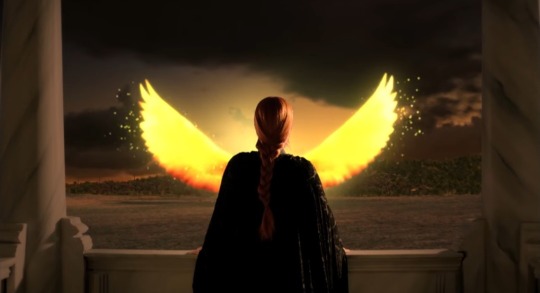
Yes, the prophecy mostly points to a bad, destructive impact, but that shouldn't be only limited to Hürrem, even though she's the dragon. I think that's rather the consequences of all the fights in the palace, the status-quo of which Hürrem/the dragon undoubtedly shook. And the "every good thing comes to an end" cycle also includes Hürrem, just as Mahidevran said in E61. And what was that end exactly? The ever present death. Including Hürrem's own.
{EDIT: I feel the prophecy of E131 affirms what I said above even more. It professes namely death as the "last judgement" for everyone, with that death both reaching the dragon/Hürrem as well and extending beyond it. And the process would finalize itself only after she herself leaves the world, thus we have both the positive and negative sides of Hürrem's impact presented. She had a part in the events that would come to pass, but she's also the (last) pillar that delays them from playing out in their fullest, most brutal force.}
#the dragon could also signify the damage of brotherly or throne war itself sure#i wouldn't mind that at all#but i see lots of signs that the dragon is Hürrem#a big part of this post is quite theoretical yes#but the direction choices of the prophecy scene itself? that's the closest to the intention we could get imo#and hürrem's possible connection to the dragon is very interesting in my book#so here's this tangent of mine#magnificent century#muhteşem yüzyıl#muhtesem yuzyil#hurrem sultan
30 notes
·
View notes
Text
You accepted the Secret Alliance ending, I live in my own fantasy where Yul got a better ending, we’re not the same.
Also to all the people sending me asks and messages telling me I’m an abuse apologist, I’m not. So stop.
Spoiler if you haven’t read the manhwa.
Please do note that this is just my opinion and my analysis on it, it’s been a while since I read the manhwa so if something I say is wrong please remember that I’m just writing this using my pure memory and some little notes I had, so if something seems off or you notice I’m saying something wrong, you know why.
I obviously don’t condone abuse in any way or form. But I do have to admit Yul deserved better, yeah he needed to heal and move on but I also think he deserved to find someone that truly loved him for who he was, baggage and all.
Even if it wasn’t explicit I do think he deserved someone new to love so he can truly move past all the stuff that happened with the main character (I don’t remember her name because I don’t care about her).
I always thought Yul did physically abuse the protagonist but after learning their backstory and learning all the stuff that happened my opinion shifted. The protagonist is a very unlikable character, at least for me, and a very plain one if I can even say that.
At the begging I related to her because I also have a very deep fear of men, I don’t physically react to their presence but I try to stay away from them as much as I can. But after learning more about her there’s wasn’t much to work with.
Yul was deeply manipulative and even scary, but also mind you, he did everything he could to get the protagonist away from her abusive mother, he even put himself in danger for her so he could save her and give her a better life where her mother wasn’t abusing her, he swore to protect her from all danger because that’s what she did at some point in the past.
Yeah he threatened her into hurting her so they could have some proof/excuse that her mother was abusing her but never really acted on it.
She saw Yul differently from other people, he treated Yul for who he was. Yeah he was prettier that boys and more “feminine” than the rest but she never took that into consideration, she saw him as a boy, and that was something that really stayed with him.
When they both stay at school overnight I really thought “wow he’s really gonna abuse her now” and yeah it was a scary thought but it is a pretty dark story, so I kinda saw it coming, but he didn’t abuse her. And that confused me.
For obvious reasons I didn’t wanted for her to be abused or anything, even if I didn’t like her I wasn’t gonna wish or hope for that. He didn’t even hit her of anything; they just stayed all night at a warehouse at school.
The protagonist had a deep fear of men even before meeting Yul so I always thought that blaming him for ‘ruining her life’ and ‘making her condition worsen’, again, I don’t recall him ever abusing her in “that” way or even hitting her or stuff like that, but again it’s been almost a year since I read the story so my memory could be betraying me.
Another thing to take into consideration is the fact that the story tried to bad to make a parallel between the protagonist’s mother and Yul but I never really thought there were any.
The girls mom always blamed her for attracting dirty men, she even told her she was the one that was dirty and that corrupted men around her. Yul on the other hand never blamed her for any of that, he even said at some point that he himself was a “dirty person” for being so obssesed with her but never really blamed her. He always wanted to protect her even if he knew he was just as dirty as the people that got near her in the past.
I do think that as Yuri, Yul was very manipulative and maybe a little obvious. I always thought it was a little weird he was so open with his obsession towards the main character with other people, but then again the story is relatively short so it could be that. But I always thought it was weird considering he went all the way to dress like a girl so he wouldn’t get caught.
The blonde guy was very unappealing, yeah he was handsome but his personality was all over the place. I think his change of heart with the protagonist was to fast and I don’t like him. I don’t know why.
I think that was the main problem with the story. It tried to push the endgame couple down your throat so bad and never made a good chemistry with them. I always skipped the chapters that focused only on them because believe me when i say I wasn’t interested.
When the protagonist thinks she gets rejected and ACTIVELY SAYS she was gonna be with Yul so she could take out all her anger and pain on Yul I was like girl please seek a therapist please.
Breakups and rejections can be hard, I lived both and believe me it was painful to watch her think she was rejected, even if I didn’t like the main couple. But still, she getting rejected was never and will never be an excuse for her treating Yul/Yuri like how she treated them. She was excessively cold and mean towards them. Even when Yul was respecting her boundaries and wishes, giving her space to get changed, not letting himself see her naked and accepting they were not gonna have s*x. To Yul this was an absolute victory, he was happy he finally won and was able to live with her even if that meant pretending to be a girl the rest of his life.
First thing to come up in blond guy’s head when the main chara is in his bed? Lewd stuff, yeah. Just like the guys the main girl used to flee so much but okay. I swear I tried to like the main couple but they made it so hard.
Lastly I do think Yul going over the guy’s house to hurt him was kinda overkill for me? But then again, he never really hurt him, he hurt himself just like he did back when he was trying to save the protagonist from her mother. He cut himself because I do believe he was tired of having to work so hard for something so simple as being loved and accepted and not be alone. And by the only person he thought accepted him for who he was.
Yeah we see her worried but then being all cold towards him at the hospital? Not my cup of tea.
And her telling him to his face she did not feel anything for him? I don’t know.
I think her reading Yul’s letter and crying was a very cheap way of saving her character but again, I never found her likable so...
Yes I cried during Yul’s letter because it showed just how much he wanted to change and wanted to become a better person. And he did, he found a way to distract himself from her so he could move on. And he does, he says he’s sorry for everything he did and tells her how much he used to love her but he doesn’t feel that way anymore and is happy and ready to move on with his life.
I think it would’ve been nice to show him with somebody else, maybe even mention he was with somebody else because he really deserved to be loved but someone who has actually willing to accept and love him despite all he did.
He was an amazing character and I would’ve loved to see him be fleshed out more or get a better ending.
Good for the main couple for having happy life, I don’t care, but Yul my boy deserved better.
But again this was just my opinion so please take it with a grain of salt.
I love Yul. He’s my boy.
#yanbae talks#secret alliance#secret alliance manhwa#rant#not yandere#analysis#kinda#watch me forget the main characters name#for the whole rant
137 notes
·
View notes
Text
An Episode Within an Episode: An Analysis of ‘The Zeppo’
The Zeppo is one of those episodes that so consistently shows up on fan lists of “underrated” episodes, that I don’t know if it can really be considered “underrated” anymore, but I think it deserves a little extra appreciation. It’s definitely an episode that takes a second viewing to appreciate, thanks to how oddly it is constructed, in a way that isn’t immediately advertised to the viewer. Other episodes with unusual styles such as Once More With Feeling or Hush very much wear their concepts on their sleeve; you can’t watch them and not immediately realise what they are doing. That’s not a knock against those episodes - part of what makes them so great and iconic is that they get right to the point and so can do interesting things with the concept. The Zeppo is just a quieter kind of unique. It uses the limited perspective of both the characters and the audience themselves to show a cracked-mirror version of the world. It’s an episode of Buffy the Vampire Slayer told from the perspective of somebody looking in on another episode of Buffy the Vampire Slayer. It’s fun and weird and I want to dig into it a little bit.
We start off with a very typical Buffy scene. In its third season now, the show is pretty aware of and confident in its own tropes, and trusts the audience to be too. We don’t need any build-up explaining exactly what Giles has found out and what spell Willow is performing and what these monsters are doing and exactly how Buffy and Faith know how to kill them. We’ve all seen an episode of Buffy before, and we can fill in the blanks pretty easily. This confidence in the show’s own tropes and what the audience expects of it is key to what makes this episode work. We know exactly how a typical episode of Buffy goes, so we can receive this barely-cliff-notes version of one and understand it perfectly. It’s an episode that can only be done in a show’s third year, when viewers have become fluent in the show’s language.
After the fight and exposition is over, Xander stands up from the garbage, as out of context as we are as viewers. As this is a Xander-centric episode, he becomes the audience identification figure. As the one character not supernaturally gifted or linked in any way (as the episode points out several times), Xander makes sense as the viewer stand-in. Xander comments on how he wants to be more involved in the fights but is firmly rebuffed - and it’s clear he wouldn’t be able to impact them anyway. All he can do is watch the fights and plots happen from a distance. In this sense, Xander is no different to the viewer, watching an episode of Buffy the Vampire Slayer, unable to affect it in any way.
This is where the structure of the episode comes into play. The A plot is a fairly meaningless runaround with zombies, while the B-plot is a finale-worthy epic apocalyptic showdown. We only catch glimpses of it, but it seems to contain all the standard hallmarks of a Buffy apocalypse - an evil cult, opening the hellmouth, tearful Buffy/Angel melodrama. Specifically, it echoes the previous two season finales, with the final showdown apparently featuring both the literal monster from the S1 finale, and some kind of sacrifice that involved Angel (evoking the S2 finale). The very last bit of dialogue we hear during this plot is “Faith, go for the heart!” from Buffy, encouraging her to kill the demon in the library, which you could argue foreshadows the S3 finale, where Buffy will use the Mayor’s love for Faith to kill him in the library. This plot is a facsimile of a Buffy season finale, giving us everything we expect and have seen before, stripped of all context, the very bare bones of a story.
What this achieves is that it alienates the viewer from this story-within-a story, forcing us into an intentionally uncomfortable position, where it feels like we’re watching an episode through a keyhole. It intentionally exacerbates the divide between viewer and show, to highlight our inability to fully perceive or at all impact this world we tune into each week.
Xander is very purposefully chosen as the POV character for this experience. He is feeling very insecure and ineffectual - unable to help with either brains or brawn, and not having a whole lot of impact on the story. He feels alienated from his friends, fearful that they will leave him behind. The structure of this episode highlights this feeling of ineffectualness. Xander feels so alienated from the events and people around him that he, like the audience, becomes separated from them. A character from Buffy the Vampire Slayer becomes an outsider to the story, watching an episode of Buffy the Vampire Slayer. We are encouraged to empathise with Xander because we are in the same position. We too have been robbed of our usual intimacy with this group of people, forced to perceive the shadows of an episode. This meta-emotion dovetails with the character’s internal mental state nicely.
I think my favourite instance of this meta-perception being played with is in the scene between Buffy and Angel, where we are dropped without context into a tearful, dramatic argument where apparently Angel’s life is in the balance, filled with declarations of love and poetic exaltations, backed by this sweeping orchestral score - and then Xander pops his head in. The music immediately stops, he exchanges a few awkward lines with them before realising they have bigger things to worry about. As he leaves, Buffy turns back to the melodrama and the sweeping music surges back in. It’s brilliantly funny - it feels like Xander put an episode on pause for a quick interjection, then re-started it where we left off. It’s a joke relying entirely on the audience’s expectations of the kind of epic melodrama we might get from Buffy and Angel, and it works really well. In this moment, Xander completely becomes the viewer, peeking in on these two actors, observing through glass.
The Zeppo is very concerned with meta references, TV, and the act of watching. Obviously the title is a reference to Zeppo Marx, and there is also a running gag likening Xander to Jimmy Olsen. We are encouraged to think of Xander in relation to his narrative function as a fictional character, and so to watch this episode through this meta lens. One key shot just after Faith and Xander sleep together shows the two of them literally reflected in a TV screen. We are literally seeing a distorted reflection of reality in a TV screen, which on one level is essentially all we do whenever we watch any television show, but is also what we are seeing within this episode - a fuzzy reflection of a Buffy episode within a Buffy episode.

There’s another shot later that I like, of one of the zombies pausing during the final chase scene to look through the library window at the demon emerging from the hellmouth. We see him looking through the glass at this apocalypse monster for a couple of seconds before continuing on with his chase, like a channel-hopping viewer taking a brief glimpse of Buffy, momentarily enraptured, before switching back to what they were watching before.
One thing that stood out to me on this rewatch was how the villains are described. We purposefully get very little on the group, but what we do get is telling.
“’Sisterhood of Jhe. Race of female demons, fierce warriors...' Eww. '...celebrate victory in battle by eating their foes.’”
A race of all-female warriors sounds very much like Slayers. They apparently eat after battles too, which according to Faith is also a feature of Slayers. The villain in this story is kind of a representation of the central concept of the show, which makes sense since it deals with Xander navigating around a typical episode of the show. You could also read it as representative of Xander’s pathologies when it comes to women and specifically women who are stronger than him.
What I like about this episode is that it doesn’t conclude by giving Xander a big important role in stopping the apocalypse, proving his worth to the group. That’s what a lesser show might have done. I like that here, Xander never gets involved with the epic finale-esque plot. He carries on existing in the spaces around it, becoming instead the hero of the monster-of-the-week runaround episode he has found himself in. Xander cannot be the hero of Buffy the Vampire Slayer, because he’s not Buffy. But he is still a human being, and all of us as human beings are the protagonists and heroes of our own stories. He can be the hero of his own life.
S3 is largely about identity and forging one’s own path in life - obviously Buffy starts by having given up her name, then has to deal with facing off against her dark equivalent and making major decisions about her future. This season’s focus-episodes for the other characters reflect that: Giles is stripped of his role in Helpless, Willow rails against hers in Doppelgangland. This episode is all about Xander coming to terms with his narrative role within Buffy - as the non-powered comedic relief and occasional pep-talker. He could become frustrated with that, throw up his hands and let himself be at the mercy of his narrative function. But this episode allows him to find his own space, his own story. He accepts that he can’t colonise Buffy’s story, but he is still in control of his own decisions, and he can still have his own story. He can create a little one-off episode of Xander the Zombie Fighter that can co-exist peacefully with the episode of Buffy the Vampire Slayer happening at the same time. It’s a smaller, quieter story without the same world-shaking melodrama - but that’s OK. As Xander says himself, he likes the quiet.
As viewers, we can never shape the course of the media we watch. That’s part of the appeal - we don’t always know what we want or need - a problem Xander faces himself when he clutches at things like “being cool” or “a car” for things that might make him happy - but a good show gives us what we didn’t realise we needed. But it remains an eternal frustration, that we can connect on a deep emotional level with these characters, but can never help them or solve their problems. A good set of characters can feel like family, but a character can never love you back. When Xander faces up against this same uselessness as he observes an episode of Buffy from afar, it is the same uselessness the viewer feels. When he accepts this and inhabits his own story, it reminds us that we can do the same thing. Television can be a great comfort, but it is not our lives. Because we can affect our own lives. We aren’t in control of them, but we can guide and impact them, and we can each be the hero of our own individual existences.
#xander harris#the zeppo#btvs#buffy the vampire slayer#meta#s3#theme:meta#theme:identity#theme:choice
80 notes
·
View notes
Text
Yassen Gregorovich - Books vs TV
With the excellent new Alex Rider tv show out, I thought I would make a comparison post for one of my old favs, Yassen Gregorovich, who has a somewhat different feel in the books as compared to the show! This post will largely cover the first book Stormbreaker and should theoretically contain no spoilers for the potential future arcs of the show, since the events of Stormbreaker are presumably non-canon now. (Spoilers abound for the episodes of the show already out, though!)
If there’s any interest, I’ll put up a second post covering Eagle Strike and some parts of Russian Roulette that delves deeper into Yassen and his complicated relationship with Alex. Just let me know!
Much like the show, Yassen was the one who killed Ian Rider. Unlike the show, however, he’s known to be active on the field and the first time we “encounter” him is prior to Alex’s first mission, where Mrs Jones gives Alex a warning:
She took out a black-and-white photograph and laid it on the table. It showed a man in a white T shirt and jeans. He was in his late twenties with light, close cropped hair, a smooth face, the body of a dancer. The photograph was slightly blurred. It had been taken from a distance, possibly with a hidden camera. “I want you to look at this,” she said.
"I’m looking."
“His name is Yassen Gregorovich. He was born in Russia, but he now works for many countries. Iraq has employed him. Also Serbia, Libya, and China.”
“What does he do?” Alex asked.
"He’s a contract killer, Alex. We believe it was he who killed Ian Rider.”
There was a long pause. Alex had almost managed to persuade himself that this whole business was just some sort of crazy adventure…a game. But looking at the cold face with its blank, hooded eyes, he felt something stirring inside him and knew it was fear. He remembered his uncle’s car, shattered by bullets. A man like this, a contract killer, would do the same to him. He wouldn’t even blink.
[…]
“Why are you telling me this now?” Alex asked. His mouth had gone dry.
"Because if you see him, if Yassen is anywhere near Sayle Enterprises, I want you to contact us at once."
“And then?"
“We’ll pull you out. It doesn’t matter how old you are, Alex. If Yassen finds out you’re working for us, he’ll kill you too.”
I always thought this was a pretty good introductory scene -- Yassen has a very deadly reputation in the books, which is established at once then hammered in over and over again. Other traits which come up again and again include his coldness and his dancer’s body which is totally something I’m into, gotta love those “elegant and deadly assassin” tropes
(also, yes, Yassen is blond in the books and definitely not a brunet or even a redhead as in the movie. he also doesn’t have a distinctive facial scar!)
Yassen doesn’t actually have many scenes in Stormbreaker, although the shadow of his presence looms pretty darkly over the narrative. Alex only runs into him twice on the mission: once from a distance -- A lean, fair-haired figure dressed in black detached himself from the assembly line and walked languidly toward a door that slid open to receive him -- and the other encounter also occurs from a distance, when Alex is spying on a mysterious delivery at the docks in the dead of the night...
And then the tower opened and a man climbed out, stretching himself in the cold morning air. Even without the half-moon, Alex would have recognized the sleek dancer’s body and the close cropped-hair of the man whose photograph he had seen only a few days before. It was Yassen Gregorovich. Alex stared at him with growing fear. This was the contract killer Mrs. Jones had told him about. The man who had murdered Ian Rider. He was dressed in grey overalls and sneakers. He was smiling. He was the last person Alex wanted to meet.
[…]
Meanwhile, the guards from Sayle Enterprises had formed a line stretching back almost to the point where the vehicles were parked. Yassen gave an order and, as Alex watched from behind the rocks, a metallic silver box with a vacuum seal appeared, held by unseen hands at the top of the submarine’s tower. Yassen himself passed it down to the first of the guards, who then passed it back up the line. About forty more boxes followed, one after another. It took almost an hour to unload the submarine. The men handled the boxes carefully. They obviously didn’t want to break whatever was inside.
By the end of the hour they were almost finished. The boxes were being repacked now into the back of the truck that Alex had vacated. And that was when it happened. One of the men, standing on the jetty, dropped one of the boxes. He managed to catch it again at the last minute, but even so it banged down heavily on the stone surface. Everyone stopped. Instantly. It was as if a switch had been thrown and Alex could almost feel the raw fear in the air.
Yassen was the first to recover. He darted forward along the jetty, moving like a cat, his feet making no sound. He reached the box and ran his hands over it, checking the seal, then nodded slowly. The metal wasn’t even dented.
With everyone so still Alex heard the exchange that followed.
“I’m sorry,” the guard said. “I won’t do that again.”
“No. You won’t,” Yassen agreed, and shot him.
Largely a reaffirmation of what we saw from the photograph scene, this time in person: Yassen is generally quiet, understated and deceptively relaxed -- up until the point he murders somebody without blinking. I think the show does a good job capturing that aspect of Yassen, with scenes like Ian’s death and Dr. Greif in the car coming to mind in particular. Gotta love that pairing of Yassen’s generally calm demeanour with the bursts of restrained yet lethal violence!
Some other minor but interesting character notes: despite being one of the most highly-paid and successful assassins in the world, Yassen is perfectly comfortable doing grunt work (passing boxes, dressing in shitty grey overalls). Similarly, despite being (presumably) more comfortable working alone, he’s also at ease with giving orders and coordinating large groups of people.
Now, moving onto the last time Yassen shows up in Stormbreaker. This is right at the end of the book after Alex successfully foils the plot of the big bad (Herod Sayle), only to get kidnapped by him while his guard is down. Sayle takes them to a rooftop where a helicopter is coming to whisk Sayle away, but first he wants to have some revenge...
"That’s my ticket out of here!” Sayle continued. “They’ll never find me! And one day I’ll be back. Next time, nothing will go wrong. And you won’t be here to stop me. This is the end for you! This is where you die!”
There was nothing Alex could do. Sayle raised the gun and took aim, his eyes wide, the pupils blacker than they had ever been, mere pinpricks in the bulging white.
There were two small explosive cracks.
Alex looked down, expecting to see blood. There was nothing. He couldn’t feel anything. Then Sayle staggered and fell onto his back. There were two gaping holes in his chest.
The helicopter landed in the center of the cross. The pilot got out.
Still holding the gun that had killed Herod Sayle, he walked over and examined the body, prodding it with his shoe. Satisfied, he nodded to himself, tucking the gun away. He had switched off the engine of the helicopter and behind him the blades slowed down and stopped. Alex stepped forward. The man seemed to notice him for the first time.
"You’re Yassen Gregorovich,” Alex said.
The Russian nodded. It was impossible to tell what was going on in his head. His clear blue eyes gave nothing away.
"Why did you kill him?” Alex asked.
“Those were my instructions.” There was no trace of an accent in his voice. He spoke softly, reasonably. “He had become an embarrassment. It was better this way."
"Not better for him.”
Yassen shrugged.
“What about me?” Alex asked.
The Russian ran his eyes over Alex, as if weighing him up. “I have no instructions concerning you,” he said.
"You’re not going to shoot me too?”
"Do I have any need to?”
There was a pause. The two of them gazed at each other over the corpse of Herod Sayle.
“You killed Ian Rider,” Alex said. “He was my uncle.”
Yassen shrugged. “I kill a lot of people"
“One day I’ll kill you.”
“A lot of people have tried.” Yassen smiled. “Believe me,” he said, “it would be better if we didn’t meet again. Go back to school. Go back to your life. And the next time they ask you, say no. Killing is for grown-ups and you’re still a child.”
He turned his back on Alex and climbed into the cabin. The blades started up, and a few seconds later, the helicopter rose back into the air. For a moment it hovered at the side of the building. Behind the glass, Yassen raised his hand. A gesture of friendship? A salute?
Alex raised his hand. The helicopter spun away.
Alex stood where he was, watching it, until it had disappeared in the dying light.
HOO BOY where to start! This is a longer scene compared to the rest but I love it so much, it’s probably the best part of Stormbreaker for me and obviously it’s fairly different from the show. I adore the last scene of the show since the tension was delightful, but this hit in a different way. Alex! And Yassen! Actually talking!!! It’s a sparse scene (like most of AH’s writing), but very atmospheric and loaded with meaning all the same.
Let’s start with the obvious stuff first - book!Yassen is fair-haired and blue-eyed (or grey, depending), and has a very measured way of speaking without any accent at all. He very much falls into the archetype of “inscrutable Russian assassin with a mysterious connection to the protagonist” and it’s delightful.
I do like the fact we only really see Yassen in person for two scenes in the entire book, and both times he kills someone ruthlessly and efficiently. (...yes, he did kill Sayle while piloting a helicopter) His reputation is well-deserved and I think the show does an excellent job with that too; every time we see Yassen on screen there’s a feeling that shit is about to go down and somebody is about to die.
The show also does a pretty good job hinting at the connection between Yassen and Alex (ughh Yassen’s expression when he sees Alex for the first time kills me every time). In Stormbreaker, Yassen does (initially) seem colder towards Alex, emotionless, just a man on a job. But even then, we get little hints of warmth shining through such as the way he smiles when Alex promises to kill him, and of course the salute! It’s pretty clear that Yassen has some measure of fondness for Alex, because no way an assassin would normally just let somebody go after they promised to kill him, even if that person is only a teenage boy (especially considering that teenage boy is driven by a desire to take revenge on his uncle’s killer). I also think it’s interesting that Alex reciprocates his salute. He’s clearly aware (even if only subconsciously) of the connection between the two of them.
Though I think what hits the hardest for me is the fact Yassen is the one to tell Alex that he belongs in school, that he’s a child and he shouldn’t be part of this world. Alex in the books is much, much lonelier compared to the show. There was no Jack or Tom there for him, since Jack was kept completely out of the loop and Tom doesn’t even exist in the book. Wolf and the K-Unit largely either ignored or bullied Alex. As for Blunt and Jones, Alex just saved thousands of kids in England yet the only thing MI6 tells him afterwards is that his actions can never be revealed to the public, his youth will make him useful for future missions, and then the only thing they give him is a doctor’s note(!!!) to explain his absence from school.
If that sounds all sorts of terrible and unfair, Alex agrees:
In the end the big difference between him and James Bond wasn’t a question of age. It was a question of loyalty. In the old days spies had done what they’d done because they loved their country, because they believed in what they were doing. But he’d never been given a choice.
Nowadays, spies weren’t employed. They were used.
And of all the people to point out how fucked up the whole situation is and how Alex needs to get out...it’s Yassen, the contract killer, his uncle’s murderer. And Yassen says it straight to Alex’s face instead of just making token protests about how wrong it is to send a teenage boy into danger and then doing it anyway. I think the moment had a fairly big impact on Alex, and I was sad it wasn’t included in the show, but ah well. Another time, maybe?
BONUS
OK i know this was meant to be a book vs tv show thing BUT I WOULD BE REMISS IN MY DUTIES NOT TO LINK TO THE LAST SCENE AS DEPICTED IN THE OLD MOVIE
‘2 minutes of questionable everything’ from the video description about sums it up. the violins. the closeness. the long lingering looks. “i’ll never forget you.”
Anyway, hope this was interesting and at least a bit informative! Do let me know there’s any interest in a part 2 of this post covering Eagle Strike and maybe a bit of Russian Roulette!
190 notes
·
View notes
Text
Folklore Songs - what are they about??
This is a developing thread, but I’ve been listening all day so I’m taking a stab at it.
1."The 1"
Common consensus is that this is about Dianna Agron and what they could have been. Telling lyrics are the general idea that the relationship wasn’t truly given a chance (”it would've been sweet, If it could've been me”) and “Roaring Twenties”, referring to the below circus themed party pics with Diana dressed like a flapper
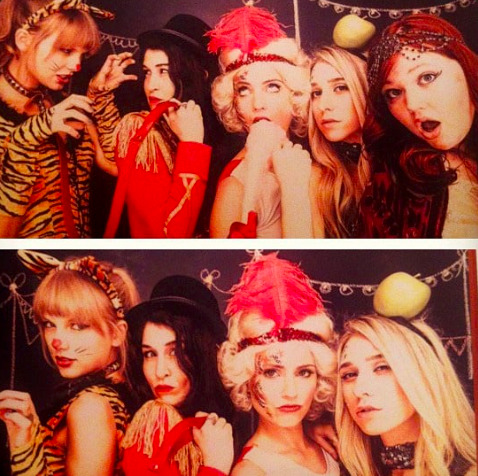
tbh im not totally sold on this - most because it seems more recent with lyrics like, “In my defense, I have none for never leaving well enough alone” sounds like a reference to ME! and “Roaring twenties” sounds like a reference to something that happened this year (2020). Also “throwing pennies in the pool” could be a reference to throwing Penni (Karlie’s agent) in the pool. Finally, Route 1 is the road along California’s coast, where Tay & Karlie drove on their legendary road trip...this makes my lil Kaylor heart worry.
2. Cardigan
This is the first installment in the Teenage Trio, which also includes August and Betty, and is told from the perspective of Betty. It’s about feeling so loved by someone but then being betrayed by them (”Chase two girls [Betty + August’s narrator] lose one”). The line ”And you'd be standin' in my front porch light” foreshadows to James professing love in “Betty”. Potentially Taylor is Betty - but I’m still thinking about that theory.
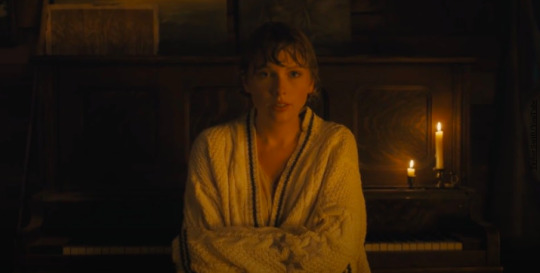
3."The Last Great American Dynasty"
We <3 a Rhode Island throwback. Here Taylor tells the story of her house in Rhode Island that Rebekah “Betty” (??!?!??!! more on that later) Harkness used to live in. Rebekah married an heir to Standard Oil which made her one of the wealthiest women in the USA at the time. She was also known for making a scene (”She had a marvelous time ruining everything”). Additionally, she founded the Harkness Ballet (”And blew through the money on the boys and the ballet”). After Rebekah’s death Taylor purchased the house and it is now best known as the place of many epic 4th of July parties.

4. Exile
Such a sad song! This is a duet between Taylor and Bon Iver, telling the story of a failed relationship that they have tried to mend many many times. Interestingly, this is also about a love triangle (like the teenage trio) - "I can see you starin' honey/Like he's just your understudy." This line specifically feels like it could be about bearding, and seeing someone else with the person you love, but feeling like - or knowing - it’s fake. “You were my town Now I'm in exile seein' you out” references and end to the relationship Taylor discussed in False God “Staring out the window like I'm not your favorite town I'm New York City”. To me this indicates that it is about Karlie and them breaking up or going through a rough patch - continually trying to fix things - and eventually being unsure that it could ever be repaired.
5."My Tears Ricochet"
This is pretty clearly about Scott & Scooter - “And if I'm dead to you, why are you at the wake? Cursing my name, wishing I stayed” and “You had to kill me, but it killed you just the same” seem to be a reference to them trying to exploit her work and how her leaving Big Machine really ruined the business - plus there’s some LWYMMD imagery. “You wear the same jewels that I gave you as you bury me” also seems to be a clear reference for trying to use Taylor’s own work against her, taking the profits, and pushing her out of the deal. As if we needed more evidence “You hear my stolen lullabies” clearly references her stolen masters.
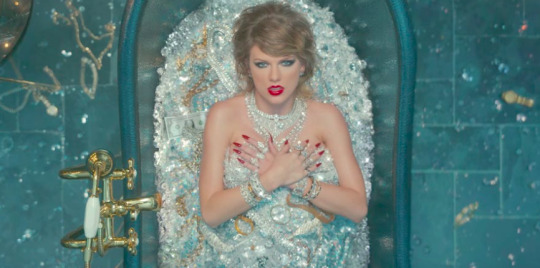
6."Mirrorball"
Big 80s prom vibes from this song. Mirrorball is about being famous and all of her work - her most personal thoughts and dreams - just becoming different ways for other people to see themselves once she releases her music into the world. Part of being an artist is knowing that your work will reflect more of who the viewer is than who you are yourself. Here she uses the metaphor of a disco ball to explore that idea, and worries that she is losing her own identity through it “I'm still trying everything to keep you looking at me”. She also alludes to her fears that she will age out of relevancy “I know they said the end is near”, something she discussed in her documentary Miss Americana. Obviously this is internalized misogyny because we love Taylor and will listen to her music always and do not subscribe to the belief that women need to be young to be relevant because if they were a man then they'd be the man, and tay’s the man <3

7. “Seven”
Personally, this is one of my favorite songs on the album. It’s so sweet and pure and lovely. This is about young love, with imagery of summer, toys, and child’s dreams to runaway together. Many people have speculated that it is about the same girl that the two unreleased Taylor songs “Sweet Tea and Gods Graces” and “Me & Britney” are about.
[Side note: initially I wondered if Me & Britney was about Britany Maack, Taylor’s long time friend who recently got married, but the names are spelled differently. Also the line in Seven “I can’t recall your face” indicates that this is about someone who Taylor is not currently in touch with.]
Both M&B and STAAG seem to be about the Seven relationship because there are general parallels with outdoor scenery, childlike wonder, and ( in the case of STAGG) sweet tea. Also all three songs indicate a gay relationship: STAGG - “And you can love like a sinner and lose like a winner”, M&B - “That boy she went ran off with, well, I thought he was crazy. Maybe I was just jealous that he'd come between me and Britney”, and Seven - “You won't have to cry or hide in the closet And just like a folk song our love will be passed on”.
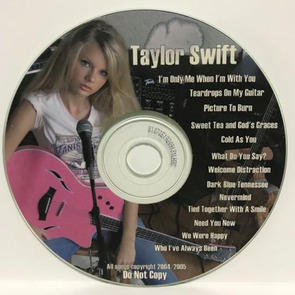
8. “August”
This is the second installment in the Teenage Trio, told from the perspective of the “other woman” who James meets while on summer vacation. The other woman (she doesn’t seem to have a name...unless it is August...which it could be? idk) is in love, but realizes that James isn’t in love with her - “Will you call when you're back at school? I remember thinkin' I had you”. The line “Remember when I pulled up and said "Get in the car" references the same incident which is retold in Betty, but this time with James telling Betty it was just a summer fling that didn’t mean anything.
9. This Is Me Trying
Here we have a break up song, about Taylor trying to win her lover back and feeling completely lost without them, unable to concentrate or be around people, and turning to self sabotage. It’s about the general loneliness that one feels when they’ve lost someone they truly love, and the miscommunication that can happen in a relationship when you’re not understanding each other or receiving love in the same way (hence the song’s title). I think this could be about Karlie, it seems clear that their relationship has not been smooth and that they have had many on-and-off times. It could also be serving a purpose of building the Joe break up narrative, but only time will tell for that.
10. “Illicit Affairs”
Taylor loves her secret love - this song reads like a sad version of “I Know Places”. It seems clear that this is about Karlie Kloss. “Tell your friends you're out for a run” is one of my favorite lines because Karlie started Klossy run club, where you commit to running a certain distance in a month - and she posts about it on instagram CONSTANTLY. But overall, the song details a relationship of a woman being with someone she doesn’t love (kushnerd) and sneaking around to meet up with the person she does love (tay!). The line “Tell yourself you can always stop” is so sad to me, the idea that Karlie got into this and keeps telling herself that it will only be a little longer and she can leave when she wants, but staying in her fake marriage anyway.

11. Invisible String
This is pretty much the only pure love song on the album - about feeling connected to someone throughout your whole life, knowing that that somebody is out there, and then finally finding them. Taylor talks about being in Centennial Park in Nashville as a teen, and then eventually showing her lover around. The song is really self referential, with lots of easter eggs for her past work, including Bad Blood and Delicate. She also references Joe Jonas with the line “Cold was the steel of my axe to grind For the boys who broke my heart Now I send their babies presents”.
Some people have pointed out that there is a similar idea presented in Jane Eyre - when the protagonist says to her love interest “I have a strange feeling with regard to you. As if I had a string somewhere under my left ribs, tightly knotted to a similar string in you."
12."Mad Woman"
Another Scooter one - “It's obvious that wanting me dead has really brought you two together”. “The master of spin” is word play referencing the masters records scandal. “Watching you climb over people like me” points out that agents and labels are making money off the performers they find and pushing them around. There’s also a reference to Scooter’s wife Yael and how he cheats all the time, but she doesn’t do anything likely because of her own internalized misogyny - “has a couple side flings. Good wives always know. She should be mad, should be scathing like me”.
13. “Epiphany”
The first verse of this touching ballad is about Taylor’s grandfather in WW2, storming the beaches at Normandy - “Crawling up the beaches now "Sir, I think he's bleeding out"”. The second verse is about a nurse helping patients with Covid-19 - “Holds your hand through plastic now "Doc, I think she's crashing out"”. The bridge here talks about wishing there was some great epiphany, some magical solution for the suffering in the world. The chorus refers to experiencing trauma with others and staying loyal even in the hardest times, even if it means literally dying. Although this seems like a departure from the themes of rest of the album, the whole album examines loyalty and considering what you would do for the people you love - so I really don’t think it’s a departure at all.
14. “Betty”
Obviously this is the gayest song on the album and an early fan favorite. It is the final song in the teenage trio, told from the point of view of James, going to win Betty back after betraying her and sleeping with someone else (August!?) over the summer. The line "Will you kiss me on the porch in front of all your stupid friends?”, a line that is very clearly about wanting to kiss a woman, is especially striking (& gay!) when sung by Taylor. The clearest version of this plot is someone begging for forgiveness after betraying the person they love.
There is also a bit of a nod to a line in “Picture to Burn”, a break up song off Taylor’s first album. In PTB Taylor says “So go and tell your friends that I'm obsessive and crazy that's fine, I’ll tell mine you’re gay”. This lyric has since been changed in versions available online, but on the original album that's what it was. This is interesting because she’s calling attention to knowing that someone is gay and hasn’t told their friends...which you would definitely know if you had dated them.
The names “James” and “Inez” are both mentioned in the song, which are the names of Blake Lively and Ryan Reynold’s daughters. James was already featured on a Taylor Swift album, as the lil baby voice at the beginning of “Gorgeous”. Worth noting that “James” is traditional a male name, but that this character is named after a female.
ALSO I have this theory I’m working on that Taylor is Betty and this whole album is in the same world with the same people, but WILL POST MORE ON THIS LATER.
15."Peace"
Ok - this is Archer 2.0 for me, about how she is worried about how no one will ever love her or stay with her because its too much work - “the rain is always gonna come if you're standin' with me” and “No, I could never give you peace” are pretty telling lines about her concerns that people will think it is not worth it to be friends with or in a relationship with her due to all of the baggage that comes with it.
The opening lines - “Our coming-of-age has come and gone Suddenly this summer, it's clear” feed into my emerging theory that all of these songs exist in the same universe and are about the same three characters...but I’m still figuring that one out. The line “And you know that I'd swing with you for the fences Sit with you in the trenches” reference Seven and Epiphany, respectively - further supporting that all of these songs are in the same world.
16. “Hoax”
Out of all of the songs that make my little Kaylor heart ache - this is the most heartbreaking. Specifically the line “My eclipsed sun” refers to Karlie, who Taylor has called “sunshine” on multiple occasions, and her light being covered up by her contract with Kushnerd and Scooter. The line “Don't want no other shade of blue But you” makes it clear that this song is in reference to the muse for the album “Lover” - aka Karlie.
However, this is a song about betrayal and completely trusting someone, only to find that they stabbed you in the back, as is clear by the line ”Your faithless love's the only hoax I believe in”.
Additionally, the line“You knew it still hurts underneath my scars” seems to again feed into the idea that all of the songs on the album involve the same characters. This one is a bit more clear, it seems that - if this theory is correct - Betty is the narrator of this song, as she referenced her scars before “Drew stars around my scars” in Cardigan.
OK- I'm going to go deep into song by song later, but I just wanted to get something out there!!! Also def interested in hearing what everyone else thinks!
EDIT: I just found some lyrics from The Lakes in an article from Billboard. I wanted to add them in even though we don’t have the full song because I felt like we really ended on a sad note with hoax and then when I saw these I was like there is hope!!
SO the lyric Billboard included in their review was “A red rose grew up out of ice frozen ground / With no one around to tweet it” which is a continuation from the line from “Hoax” - “ This has frozen my ground”. What I’m taking from this is that in the final song Taylor finds hope <3
165 notes
·
View notes
Text
Hot takes galore 2: A brief overview of fandom backlashes that influenced fanfiction writing traditions as I have personally experienced them.
In this segment we examine...THE INDOMITABLE MARY SUE!!!!!!!!!!!!!!!!
So, as I was entering fandom in 2008 (Bleach, a manga by Kubo Tite), the hottest, sweattiest discourse pertained perhaps to Mary Sues. I thought the hatred of Mary Sues had completed its cycle and it was dead and gone in our days, BUT I happened upon a post that said that we are all stanning Moxiang Tongxiu’s OCs (original characters), in a sort of admonishing tone, and I couldn’t help but smile.
For back in the day, OCs, were termed self-inserts at best, and if they were a female protagonist that would sideline the canonical cast of characters then they were Mary Sues. And there were as many people hating original characters, and Mary Sues in particular that I remember sitting up all night thinking on whether I should post or not this fic that had some OCs in it that were there to just deliver some messages.
And of course this bled into accusations of writing canonical characters as basically “original characters” or “self-inserts”, by use of the term “ooc” (out of character). Personally, I thought this was over, but recently Riri accused me of disregarding the existing characterization and turning the CQL characters into my own original characters...for KINKY HAVOC IN VOLCANO PALACE!
An unjust accusation, I feel, Riri, because I do my damnedest to maintain characterization even under the wildest circumstances.
People were looking to extend their enjoyment of the existing characters and story, and for some reason fanfic authors could come under fire for not catering to that, and writing for their personal self-fulfillment.
And there were as many people writing oc’s and Mary Sues as there were people hating them, and the writers for it. It was chaos, there were journals (i was in livejournal) devoted to roasting mary sues, laughing at authors etc. If you came in fandom after me, you live in much much gentler times, and perhaps you have the Mary Sue to thank for that, because the Mary Sue kickstarted a lot of fandom feminist discourse.
Back in the day they usually determined “Mary Sue” as an overpowered, female character, whom everyone loved even though she might not be particularly charming (by whose standards?), who was adept at everything, knew everything, felt everything etc.
The thing is that Mary Sues did not seem to exist only in fanfiction, but everywhere around us, whenever there would be a project film/show/comic/book that had a strong female protagonist.
And that was because fandom and male nerd culture were intertwined. Anime, games, comic books were heavily “invaded” by swaths of girls who were not quite fulfilled by corny pop stars, or saccharine rom coms, and seeing that there were no female power fantasies available in these media, they created their own.
It was a very interesting time because if you remember, Marvel Movies started getting made around that time, riding on that convention power, which was dominated by male nerd culture - and that is why they gave so little screen time to female characters, because the demographic was pretty thoroughly examined and they were found to dislike any and every female character that was not there to validate the male character’s cishetero sexuality (YEAH BABY)
I mean women, actresses, female characters had a good portion in media, and the marvel cinematic universe and its imitators pretty much sidelined all these people very aggressively. Male stories started exploding and taking over during this time, exploiting that very vocal male nerd demographic.
But where is the backlash you ask, because so far we’ve only seen the oppression.
I saw a lot of writers struggle with the validity of the female character, and then the validity of female writing. They conflated writing female characters, as writing without examining themselves, or attaining a neutral voice and a role of representing accurately reality (lol). Writing Mary Sues was bad writing, and at some point all women were Mary Sues.
...So can you guess what happened?
A lot of these people turned to male slash in order to cope. Before the Mary Sue hate, male slash was a considerable but not dominant piece on the fanfic pie, which was mostly dominated by main het ships. Male slash was already enjoyed by female heterosexual audiences, but it started gaining more and more traction until a term was coined (shipping goggles), and accusations were once more flung: that fangirls will ship any two white dudes - not untrue.
This audience was not very friendly to actual gay people. There were all sorts of strange views passing before my bespectacled eyes at the time. People proclaiming that they loved yaoi (i was in manga, so this was the term used), but would not watch gay porn, and thought gay people were gross. And in the case where gay people were in fandom these people often complained of not being included/invited in fandom activities, or having minimal readership from groups that promoted male slash, but not gay writers.
This is why I often say fandom is not a friendly place for lgbtq people, because this type of audience still exists, even if it had to suppress their discomfort and assimilate the rhetoric of allyship at some point. And sadly a lot of people who dominated these early discussions about fandom becoming more lgbtq friendly since it consumed such relationships in media, managed to set this climate of dishonesty where everyone is pro-lgbtq in theory, but not in action.
Meaning a lot of stereotyping that is not endemic to actual lgbtq communities. Like top-bottom (most people are verses), whiny bottom, subby bottom, violent top, aggressive sex, hypersexual gay characters, almost complete erasure of bisexuality, lesbians what are they?, a complete and absolute fear in portraying trans characters, suppression of genderfluidity, accusing people of writing male gay characters as female characters as a form of wish-fulfillment or supposed homophobia.
A while ago I saw this article asking why lgbtq people are so mean to each other that confused me thoroughly, until I remembered this call out phase that happened a while ago and still goes on, where everyone blames everyone else of abusing and gaslighting them, friendships falling out etc, which is not at all the reality of older lgbtq scenes, because these were not formed online under this climate.
And because fandom is a vehicle for self-exploration a lot of people to this day conflate consuming lgbtq relationships through media as being lgbtq themselves, or these “actual” relationships being set as these other fictional “idealized” relationships. Whereas in older lgbtq scenes a lot of people come into them by realizing their attraction to actual, real, live people and not characters, or hot celebrities.
I am not saying that current lgbtq people who discovered that about themselves online are lying, or lying to themselves, but they definitely came out in an environment of fake acceptance, and have a hard time reconciling reality with that lie of acceptance through no fault of their own, of course, because they never developed the language and the understanding that language brings in order to communicate amongst them. The characteristics were set by a group outside of them that might be pro gay marriage, and having a cool gay friend, and the inherent tragedy of homosexuality or something, but are not really for it - as a very wise queer eye contestant once said.
And so every trespass by their own people, becomes a proof of this generalized rejection with tremendous consequences for young people’s mental health. YOU ARE BEING GASLIT IT’S TRUE - but not by your own people, it’s just a miscommunication going on there.
BUT WHAT HAPPENED TO THE MARY SUE. She changed. She stopped seeking love, sex, and power, or at least pretended that she did not want any of these things, or did not understand them, she stopped speaking, and became more stoic so people wouldn’t judge her opinions, and finally one day she went on to accomplish great things, because women seeking representation was also a pretty set demographic, and somebody could and would exploit that!
The Twilight Saga, Fifty Shades of Grey, even Hunger Games, are the media progeny of the Mary Sue powering through the entirely of male nerd culture. In a whole decade where people wanted Marvel to release a Black Widow movie, there have been three major spy/action girl movies that did very well in the box office, and since producing and releasing a movie usually takes three years, i’d say the audience was heard loud and clear - even though not by Marvel.
And the side girls in these Marvel movies, or other action movies, became more and more badass - they all went from damsel in distress, to saving the hero, and of course the male characters were subsequently “queer-ified” until everyone was finally happy, and nerd culture was exposed as having been infiltrated by neonazis and that’s why it was making those unreasonable demands for no women ever in the first place.
And everything was right in the world, except that it was not. Because...girls had also been infiltrated by “neonazis”. A lot of these media, and a lot of these “white” Mary Sues, fall under many conservative criteria. Conservatism being a nice word for fascism.
A few examples is the person of color always dies, or is brutalized, or is admonished constantly even as they shadow the protagonist in order to reinforce their inherent radiance. Characters who might be poc in books or in the anime (hur hur), are whitewashed in the visual media. The women are almost never comfortable with sex or romance, always thinking about the future and amassing power, not for themselves, but for the benefit of the resistance, or the family, or any other entity they belong to. And of course they are forever incredibly flawed - as opposed to idealized versions of male heroes always on the side of good for the right reasons! Also a minimal cast of women, with one woman being the protagonist, and the rest functioning as side characters or mostly antagonists.
So every time you feel a slight trepidation for not being the right type of lgbtq for writing something that is not strictly anal, or fear to include feminine characters, every time you erase yourself from the narrative it is it, the spectre of the Mary Sue coming to haunt you with a “We won, what more do you want?”
8 notes
·
View notes
Text
I think I'm talking about confidence, I'm not too sure.
I was fifteen when I first saw Great Teacher Onizuka. My friend had lent me the DVD set (as you did when it was 2008) and I was about to spend the day watching it, feigning some illness to get out of school for the day. I needed some time alone, to process everything that had been going on around me.
For context, my parents were in the middle of a divorce. My mum, the most amazing person in the world to me, was not having a good time and I was not at all possessed with the skills to help her cope. Processing the concept of divorce, while trying to mediate the two adults going through it, wasn’t something I could handle. I didn’t know what I was doing. I needed a whole day away from friends and away from parents. While everyone was at their day job, I could think about everything and nothing, uninterrupted.
My attempt at getting out of school worked, however it came with a caveat. Mum had decided she’d take the day off with me. Feeling defeated but still stubborn, I insisted that if she was going to stay home too that we were watching GTO. I really had no idea what I was getting myself into.
GTO begins with our protagonist, Eikuchi Onizuka, squatting down by a payphone, trying to stare up the skirts of some high school girls coming down the nearby escalator. That’s a bold open. Two delinquents notice this and attempt to then extort him for cash. He promptly beats them up, forcing them to use all the money they have to buy him some food from the nearby convenience store. This scene establishes a few things straight off the bat: Onizuka is, first and foremost, a pervert and he’s physically strong but not to the point of unfairly asserting dominance over others. Onizuka dreams of being a teacher of all things. He wants to be the teacher he never had, being there for students outside the classroom as well as in. The series showcases Onizuka using his ex-biker gang leader skills and sheer determination to change the attitude of the antagonist students in his class. Each week he solves the reason behind their resistance toward him and they join his team until eventually he really is the Great Teacher, Onizuka.
The first delinquent problem Onizuka solves is that of Mizuki Nanako. Her parents aren’t divorced but they’re not exactly doing well. Ever since her father’s company started doing well and they moved into a mansion, she feels as though her parents just aren’t seeing eye to eye anymore. She blames it on a simple wall separating her parents’ private rooms. Before it got put up, her parents would talk and laugh together, sharing in their joys but also their defeats. Then before she knew it, they put a wall up and stopped sharing anything at all.
So, Onizuka arrives at her house. He’s got a bandana tied around his head, his abs gleaming as he’s smoking a cigarette. More importantly, he’s holding a sledgehammer, ready to demolish that wall. With her parents yelling at him threatening to call the police, Onizuka ascends the staircase and begins to take down that wall. Every powerful swing, shaking the wall and cracking the foundation.
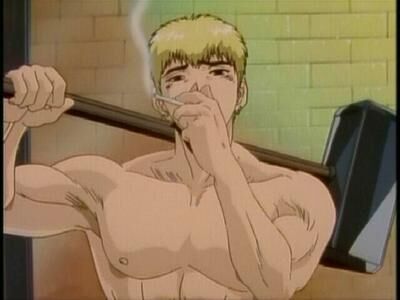
(What a man what a man what a man what a might good man)
It felt cruel watching this scene with my mum. Here we were, two people still trying to process a big life event, opting to spend the day away from the problem. Here Onizuka was, just smashing through the problem with nothing but conviction, stupidity and sheer confidence. I couldn’t quite conceptualise the thought just yet but I think I envied that confidence. I wanted to be able to take a sledgehammer to this invisible problem and fix it. I didn’t know what an actual sledgehammer would solve nor was I even able to figure out what my situational sledgehammer would be, I just knew I wanted to be more like that. I wanted that confidence; I just didn’t know what it was yet.
Confidence. A complete assuredness in your actions. You may not have any idea of the outcome of said actions but you’re certain in the choice you made taking them. Maybe that’s just one definition. I struggle to this day with how to define confidence, I’ve been confident at different times in my life for different reasons. Mainly it’s been something I’ve found as I’ve gotten older though.
I struggled a lot with it when I was younger. I’d struggle to find it and when I did there was someone there trying to take it from me almost immediately. Pink polos were gay, skinny jeans were gay, being interested in anything outside the norm was gay as well. I wasn’t bullied by any means but there was always somebody around to tell you what they thought. I’d fold under that kind of pressure. I remember when I was 10 and we were in music class, I sang a little too loud and the popular girls behind me started pointing and laughing, clipping me before I got too sure of myself.
I got older and I thought I’d found confidence through weight training, but it was just arrogance. I genuinely thought I was better than other people in my creative writing class because I picked heavy things up and put them down. Of course, this had a drawback, whenever I’d meet someone bigger than me, I’d feel pathetic, jealous and inferior. I thought I’d rid myself of this arrogance when I started studying Japanese. My initial study was diligent and excessive. I’d have two Japanese classes a week and spend the rest of my time after work revising. Looking back now it was necessarily efficient studying, but in terms of time put in the hours were there. I believed I was working hard, which led to this arrogance in my abilities. An arrogance that was swiftly cut down whenever I met somebody better than me.
So, I always arrived at this juncture where I’d learn a new skill or hobby and wonder how to be confident in myself without comparing myself to others. I didn’t quite know how to praise myself for doing well at the gym or learning something new in Japanese without immediately comparing myself to others. It meant that I’d occasionally have these emotional highs when I achieved something only to be brought down to earth when I saw that somebody could do it better. I didn’t know how to make my achievements my own. The confidence I had was too fickle, it didn’t come from within and it often led to feeling superior to others based off of a single quantifier.
I was still uncomfortable with myself. I wanted outside validation which led to comparison, boasting and arrogance. I didn’t realise that I couldn’t get any of that from anyone else, it all had to come from within.
It’s taken me 14 years, but Onizuka finally made sense to me. I was watching the incredibly famous (in Japan) live action version of GTO one night, which turned into a nostalgia trip as all the episodes were almost identical to their anime equivalent. As I was watching I was wondering why I still hold this fictional character in such high regard, of all the powerful charismatic anime protagonists I watched in my teenage years, why does Onizuka persevere?
It’s because he’s kind of a dork.
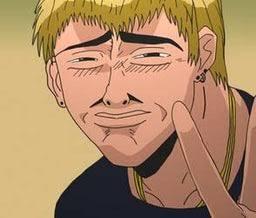
(Get you a man that can do both)
Along with the confidence and strength that being a protagonist in a medium geared towards young boys affords you, Onizuka also has some very human flaws and vulnerabilities. The intense scenes like surprise renovating Nanako’s house or rescuing a whole bunch of kids from a gang are always juxtaposed with him being absolutely wayward in so many other aspects of life. He lives at the school because he can’t afford rent, he’s 26 and never had a girlfriend and his only friends are his students. We are always shown that his confidence isn’t intrinsically linked to how well his life is going, it’s just his feeling and determination in the moment. For all that bravado we see, we’re also shown the more human, relatable aspects. He’s amazing, brave and confident, but at the same time he’s still vulnerable and human.
Yet here’s the thing, I thought confidence meant a lack of vulnerability. I thought one couldn’t be both confident and vulnerable. This isn’t some segue into Boys Don’t Cry or a delve into masculinity. I didn’t believe that vulnerability wasn’t masculine, I just thought that vulnerability meant you had a long way to go before you were allowed to be confident.
(These lines go from bravado to insecurity in an instant, but I still think Tyler is confident as fuck)
I show what I feel to be the pretty vulnerable content on this blog. I write about my doubts and insecurities, the events that shaped me and the times in my life where I really felt at my lowest. I document the struggle I find myself in now, trying to carve something for myself and come to terms with the changes that keep happening around me. I don’t think anybody reading this would have an image of me as an outgoing, confident person. There’s rays of positivity sprinkled in occasionally but it’s generally content that I struggle to tell people in person.
Before starting this blog, I would have imagined that if I wanted to become this confident idealised version of myself, I’d need to erase any form of vulnerability. Delete the Instagram posts with moody lyrics, delete the couple shots and stop caring. I’d need to kill part of myself to become someone different. I couldn’t consciously accept that they were two signs of the same coin, even if I knew it in the back of my mind. The more I’ve been writing the better I’ve been feeling. These fears and insecurities being out in the open don’t make me any weaker, they actually feel like progress. My weaknesses will exist regardless of whether or not I tell people about them, my insecurities won’t disappear overnight. I’ll never be someone I’m not. What I can do is take these things that used to terrify me and put them out in the open. In my last piece I waxed on about making my words my own, by verbalising and bringing these thoughts into the open I feel like they become my own. They’re not completely stripped of power but they don’t hold the same sway over me that they once did.
So that leaves me with confidence. I can air my vulnerabilities and doubts but then where does my confidence come from? How do I then stop it from becoming arrogance?
Let me tell you about Charisma Man.
You know how when Superman goes back to Krypton he’s just a regular person, but on Earth he’s basically a God? Charisma Man is a joke (turned comic) about how Western Men often believe themselves to be Superman on Earth when they move to Japan. Why? You’re basically bombarded with compliments from the get-go. You get told your Japanese is amazing (when it’s not), that you’re so tall (when you’re short back home) and that you’re such a handsome man (when all experiences up until now have led you to believe the opposite). Thus, you create a kind of false confidence for yourself. Or do the people around you do it for you? You yourself haven’t changed but the people around you have, and they’re whispering sweet nothings in your ear.
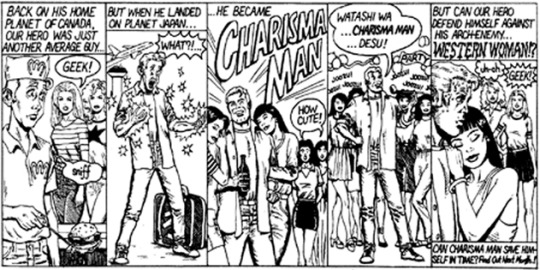
(Honestly didn't know it was a comic, initially heard of it on a subreddit making fun of other expats in Japan)
Hell, maybe I am good looking? I studied Japanese for a year back home, maybe I am just really good at it? Maybe those people around me back home were just obnoxiously tall and mean. Maybe I am the shit. You begin to formulate this new identity for yourself. You are Charisma Man now. You’ll be making heaps of money, have girls on standby and be loved by everybody in no time.
Except that never happens.
The reality of Charisma Man isn’t so bright. You’re probably an English teacher living somewhere far away from the big city. Your apartment is probably small and old and your salary is half as much as you were making back home. Despite being told about how good your Japanese is, you still can’t turn on the TV and watch a program. You still can’t go to the bank and open an account with your bilingual Japanese friend. You’re still single and you’re probably getting fatter off convenience store fried chicken, if anything.
It’s fake confidence with no merit, built on nothing. You haven’t put yourself out there or done anything to earn that confidence so it always feels foreign to you. There isn’t some feat you perform or some hurdle you cross to get that kind of confidence. You’re not smashing walls with your sledgehammer or confronting your fears and growing. You just get fed compliments until your confidence balloon bursts.
I felt like I was Charisma Man for a hot minute. Separated from everyone I knew, out drinking every night, being complimented left right and centre. I kept trying and failing to keep my feet on the ground. Back then I thought it was new-found confidence, but I wasn’t really coming out of my shell; I was just being obnoxious. After long the facade faded and I realised I was the exact same Elliot I was back in Australia, just with less money and a nicer haircut.
I began to think about my experience. Why was I so confident? Why did it dissipate so quickly? Why was I not the only one that experienced this little phenomenon?
I came to the conclusion that confidence can come from many places. It can come from other people, but then it’s reliant on the praise of others. It’s shallow, fickle and bound to dissipate sooner rather than later. You’re constantly reliant on the praise of others to affirm who you are as a person, you can fool people into giving you praise but that goes away before you know it as well.
It’s a big enough of a struggle to understand yourself, it’s near impossible to understand strangers. Relying on such an unstable form of validation is essentially just inviting mental trauma in the long run.
On the other hand, confidence can also come from within.
After I distanced myself from all that charisma, I began to realise that I felt my best and my most confident when I actually put the work in. I started properly studying, eating well, and writing down my thoughts. It didn’t matter as much if people didn’t say anything, because I went to bed every night knowing that I put in enough work. Nobody said anything about the change, but I felt like I was becoming my own biggest supporter.
It’s both rewarding and daunting when you switch dopamine suppliers. I used past tense in those last few sentences because that particular fountain hasn’t been flowing so well lately. The flip side of not letting other people’s compliments fuel you anymore is that when you’re not doing right by yourself, that confidence tend to dry up pretty quickly.
2 notes
·
View notes
Text
Devin’s Playlist -2010s Part 1
This is an unfinished retrospective look at what I listened to during the 2010s. This decade was exceptional for me, as it was the first decade where, for almost all of it, I was not a musician myself.
Being a musician forces you to listen to music like a musician, and being free of that, and able to listen as a listener alone, really made this a spectacular decade for me. I found dozens of incredible albums that were released during the decade, many of which received no significant recognition.
This was a very large project, and I did not finish it. I made it through Retrowave, Shoegaze, and Post punk. If anybody cares, I will finish the entire project, which will add Dreampop (the largest category), Vaporwave, and Dark Ambient.
Retrowave: Retrowave is electronic music that, at first listen, sounds like it may be from the 80s or 90s, mostly because the synths it uses to generate the music are either retro-inspired or literally retro equipment in some of the more extreme cases. It generally features original compositions, often, but not always, is instrumental. Rough vocals would impede the tightness and angularity of the music, so when vocals are used they are often pop produced and highly melodic. This genre gained significant exposure from Nicolas Winding Refn’s 2011 masterpiece, “Drive”.
Galactic Melt (2011) Com Truise
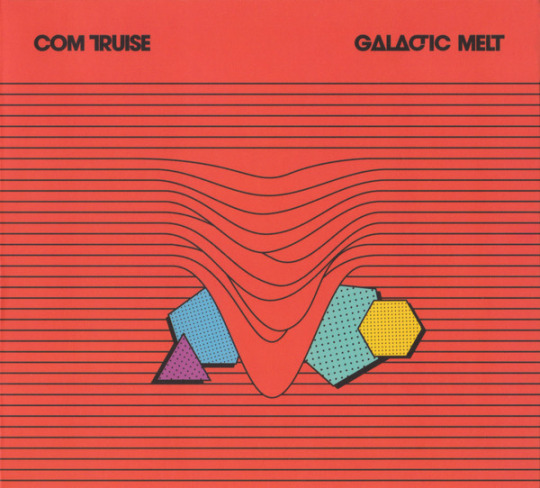
Electronic artist Com Truise rose to prominence off of this fantastic record, which rallies around the undeniable electro anthem of 2012, “Brokendate”. Starting with some found audio (chopped and screwed found audio becomes a big deal later on in Vaporwave) and then dropping in an absolutely thick beat we’re met with a song that eventually, as layers are dropped on, ends up being meditative, romantic, and melancholy. Emotions to that point, not well associated with dance music, but definitely would come to color the entire decade.
Era Extraña (2011) Neon Indian
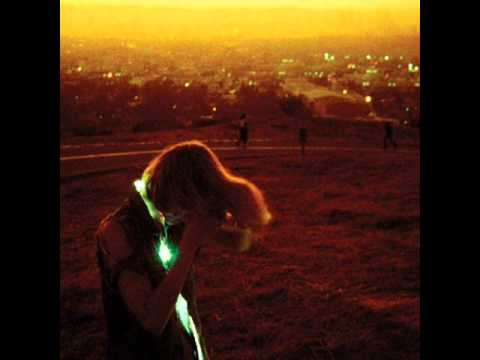
Electronic solo bedroom pop was pretty cool at the end of the 00s being pushed hard by guys like Twin Shadow. I am not sure how I got ahold of Neon Indian but this album was, in a lot of ways, the true start of my musical decade. I had not been so excited and enthusiastic about a record since I had retired from making music. It really gives you a new perspective to not feel like you’re in competition with everything and trying to learn from everything- just as a listener, I was enthralled with this entire record.
Visitors (2012) Lazerhawk
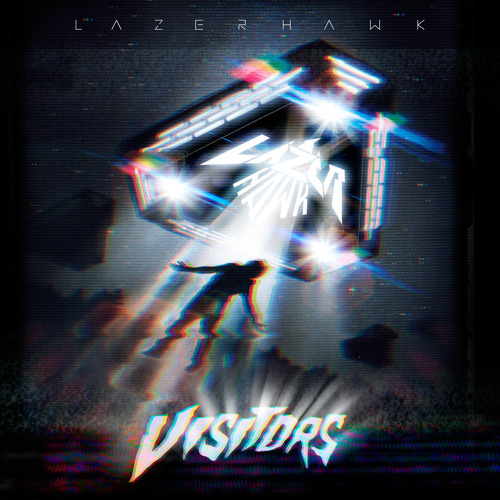
I did not get into dark retrowave until after 2013 and thus discovered Lazerhawk and this record after the fact. Visitors is, in my opinion, the best dark retrowave album ever made, more consistent and listenable than competitors such as mega drive or carpenter brut. Also. This album absolutely sticks the landing with the street-strutting powerhouse “Arrival”.
I am the Night (2012) Perturbator
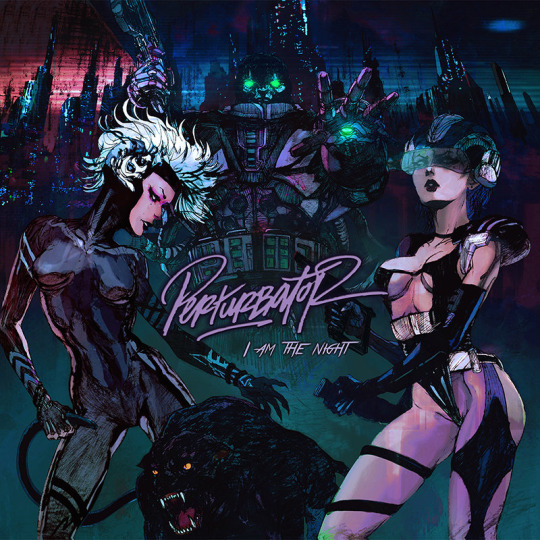
Made famous by soundtracking the indie game hit Hotline Miami (one of the best games of the decade), Perturbator carved a niche for himself with fast, brutal, high energy dark electronic music and absolutely bonkers live shows. Perturbator has a large catalog of content- I am the Night is definitely the starter kit. Starting off with a thick minor chord, a church bell, and a sample of Peter Finch’s speech from “Network” you immediately know what’s in store- dark, dystopian and undeniably French electronic dance music, complete with breathtaking beat breaks, big bass synths, and complex compositions.
Innerworld (2014) Electric Youth
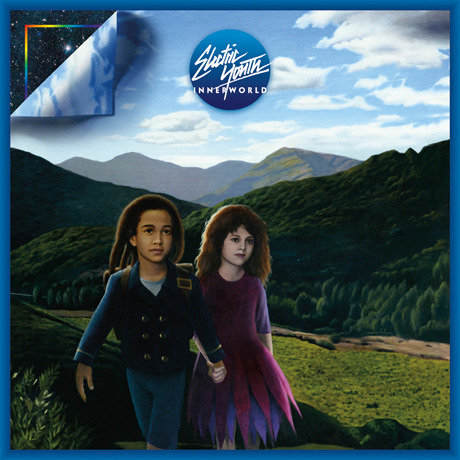
I had mentioned that Drive was a major popularizer of retrowave- and one song in particular, a collaboration between another retrowave artist named College, who created the low fi, catchy bassline for the song “A Real Hero”, and the vocals and lyrics, created by an artist called Electric Youth. Their record, 2014’s “Innerworld”, is one of the best retrowave efforts, with the second track, “Runaway”, even better than the song that made them famous. The pop chorus “Maybe we could just run away for good/cuz we’re both mis understood” soaring over thick, atmospheric synth pads will have you slapping the roof of your car, as you race through the freeways of LA at 3AM.
Atlas (2016) FM-84

Speaking of roof-slapping bangers, “Running in the Night” is probably retrowave’s most popular anthem, boasting one of my absolute favorite vocal performances of the decade. A group claiming rock and roll city San Francisco as their home base (despite being both British), FM-84’s Atlas is absolutely packed with a mixture of the atmospheric instrumental Miami Vice type music suggested by the red and purple setting sun cover as well as vocal driven pop songs such as the single mentioned above.
Hardwired (2018) Mitch Murder
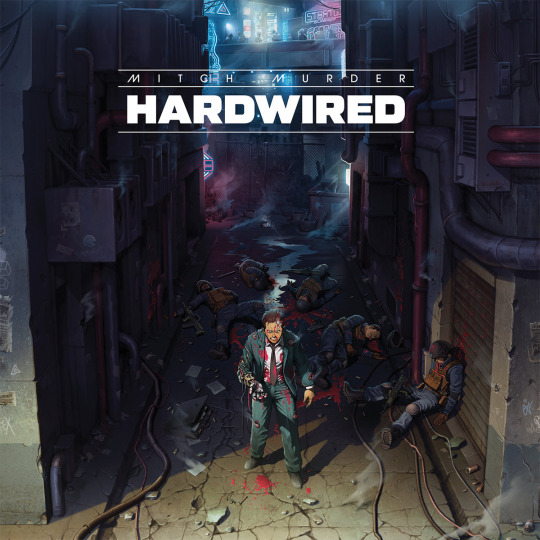
Mitch Murder is a retrowave institution, having made the soundtrack to the viral youtube movie Kung Fury, and also, I suspect, the original music used by twitch personality Dr. Disrespect. However, he almost entirely releases 3-5 song Eps, making it tough to pick out a standout. However that all changed in 2018 with the release of Hardwired, the most accomplished mitch murder release to date. Starting off with the Jan Hammer style “Altered State”, it stays on brand throughout but tells a very unified instrumental story of cyberpunk dystopian adventure. Vangelis-style synths bring in the closer track, “Revision Control”, one of Mitch Murder’s greatest tracks. Evolving through different moods, different scenes, we can imagine the “human” protagonist confronting his cyborg nemesis he has been tasked to execute.
Retrowave Album of the Decade:
Dark All Day (2018) Gunship
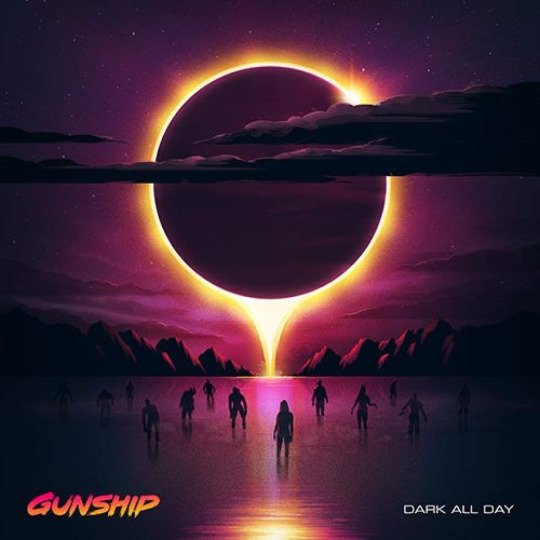
As the decade wore on, retro wave slowed down for me. I thought it might be over but- without warning, Gunship, an artist I had listened to but not been completely impressed by, released what is probably the most accomplished album in the genre. Spanning various tempos and musical themes, utilizing several guest vocalists, the scope of “Dark All Day” keeps you listening to the record again and again. This record represents an evolution in a format that was at risk of being just a fad. “Come on lost boys, lets stay alive” over a ripping saxophone lead suggests mere 80s fetishism, but there is more substance than just that. The following track, “When you Grow Up, Your Heart Dies”, takes an upbeat electro jam, and really goes for emotional impact with a series of samples of characters from pop culture saying inspirational things, my favorite being “Everything worth doing is hard” which I think is just Teddy Roosevelt. My favorite track of the record, the slow ballad “Artemis & Parzival”, begins with swooning, Vangelis-style pads and then into guest vocalist Stella Le Page’s gorgeous vocals. This track definitely belongs on anybody’s make out playlist. “Were all gonna die that’s just how it is, there’s no escaping the future, nobody gets what they want in this world, even for you and me” is one of the greatest lyrics of the decade.
Nugaze/Shoegaze-Adjacent: Shoegaze is a genre of music that features highly layered guitar effects (often run through 10 or more effects, creating a signature “vacuum cleaner” sound with a ton of distortion and white noise) and breathy vocals. Relying heavily on the depth of character of the sound, shoegaze guitar tone and production is a major creative point and almost all of these records are self-produced. Vocal themes are usually depression-inspired and lovelorn meditations, the music sounds, to most, dull and dreary, but to some, it speaks deeply to their feelings about the past and future. Shoegaze is often mixed with other guitar genres on this list, from Post Hardcore(Nothing, Title Fight), Black Metal(Deafheaven), and Thrash Metal (Astronoid).
Road Eyes (2010) Amusement Parks on Fire

Around 2010, I was promoted at my job to a new role that would require a bunch of travel. I was not a big fan of riding on airplanes. Also around that time, my brother had moved into my apartment, then out of it, and I only had a few months left on the lease. My favorite shoegaze band of the 2000s, Amusement Parks on Fire, played a gig at 330 Ritch, a club in san Francisco. I had a fantastic time at the show, and particularly loved their new material, which made it onto a record they called Road Eyes. 2 months later I moved out of my apartment in San Francisco and never would go back to living as a single dude.
Anyways, the travelling. The opening and title track to the record came to symbolize change for me. And it also was the song I would listen to every time my plane would take off. It helped me deal with the fear that something might happen- no matter how insignificant the chance – and if it did, while that song was on, it would be okay. Indeed, this was, and I will warn you I am not qualified to treat mental illness, but this actually really made flying much easier for me and it is a ritual I continue to do to this day, whenever possible.
Pipe Dreams(2013), Sway(2014), Feels like You (2019) Whirr


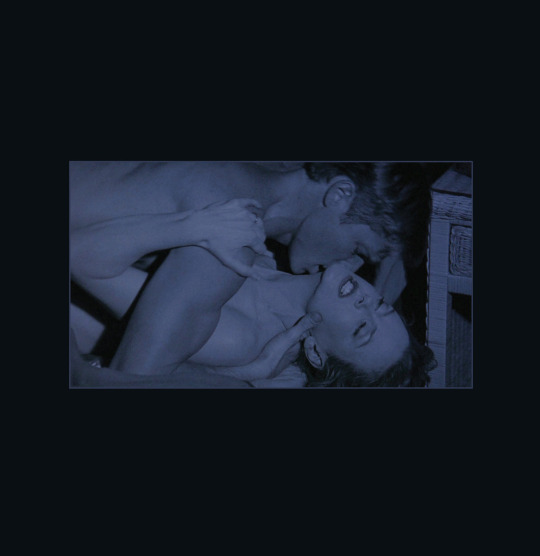
San Francisco nugaze/dronegaze band Whirr, large and complex, problematic, aggressive, are behind some of my favorite music of the decade. Their three album career reflects to me upon the primary feelings of youth: euphoria, anger, and sadness.
Pipe Dreams is a blissful set of jams, meditative, energetic uptempo and with almost totally co-ed vocals. Noisy production casts a hydrocarbon haze over the songs, raw vocal melodies reach out of the fuzz and suck you in. “Junebouvier” and “Toss” capture the euphoric and youthful energy of a summer in San Francisco: starting off with breakups May thru July, and hot hookups until September or October when people settle into relationships. Two hungry eyes emerging from straight-bangs to make eye contact with you, and hold it- the exhilaration of touching somebody new.
Sway, the band’s masterwork, starts off with a heavily muff-distorted major 7th chord suspending us until the massive drums, now a hallmark of the band’s sound, kick off the beat into the opening rocker Press. The band switches up rhythms between drums, guitars, and bass to bring rock and roll-type turnarounds and breaks that really keep you on your toes and engaged. The lead guitar is classic legato shoegaze, using delay to achieve a long, sustained scream. Compositions are key on this record- not following just simple A/B patterns there’s some thought to the structure of the songs and record. “Dry”, in particular, demonstrates some of these ideas. A/B sections, underscored with “Drown me everytime… Dry”, give way to breaks, ethereal echo guitar solos, giving a hint of the powerful ending. A 4 chord progression accented by breathtaking drum fills finaly flourishes into a screaming cymbal-laden guitar finish.
Feels like You, the bands purported final album, starts off with some quiet echo piano. The melancholy major 7 chords the band has leaned on throughout their music are laid bare as we press play on the record. Add guitar. At a little after 90 seconds the band jumps in after with a thick blanket of lonesome self-reflection and chemical depression. The bands penchant for composition remains to the end, with changes keeping you engaged as the noise soothes your heart. “Younger than You” is one of the band’s greatest tracks, starting with an almost Smashing Pumpkins/Silversun Pickups esque clean unison guitar/bass into distorted and layered noise, ending with a drum-guided, rock and roll style outro.
Guilty of Everything (2014) Nothing
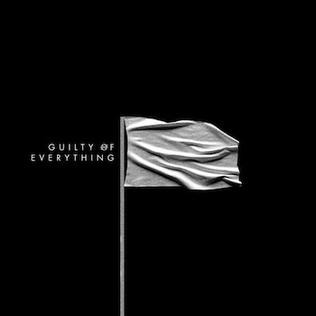
One of the things I mention in my preface to this is, for me, the 2010s were the first decade of my life that ended with me not being a musician. And it opened some doors for me, creatively, to be able to hear music and think about it purely as a listener and a person. Something others have frequently described to me, that I had never really done, was just spend an entire weekend listening to an album.
I saw Nothing on KEXP 5 years ago when Guilty of Everything was out and they were on tour. I’ve seen them twice in person since them and bought every one of their records. The weekend that I got Guilty, I was attending a close friend’s sisters wedding, and pretty much was in a hotel room drunk in overcast-as-fuck santa cruz all weekend. And you know what was being played through headphones at practically all times.
Nothing is mostly the musical project of a guy named Dominic Palermo, a punk from the Philly scene that had spent more than a year in prison for a stabbing. He isn’t much of a vocalist or guitarist, but he is a fantastic artist, writer, photographer, and visionary, and the creative force behind what is now a rotating cast of other musicians.
Guilty of Everything is definitely their best record, opening with the massive meditation Hymn to the Pillory, into the definitive single Bent Nail, a perfect marriage of hardcore punk and shoegaze elements, falling apart into the 90mph crash, into a wall, final outro chorus “If you feel like/letting go…” repeated over and over over pure drone guitars, seamlessly flowing into the romantic slow jam “Endlessly” The closing title track is one of the best closers of the decade, perfectly sticking the landing on this brilliant lyric: “My hands are up, I’m on my knees I don’t have a gun, you can search me please. I’ve given up, but you shoot me anyway, I’m guilty of everything. I’m guilty of everything”.
Hyperview (2015) Title Fight
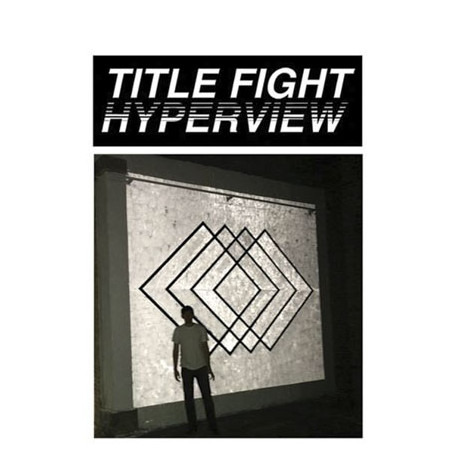
Nothing wasn’t the only Pennsylvanian post-hardcore band to bend their sound a bit shoegaze. Title Fight also sneaks onto this list with their outstanding record Hyperview from 2015. Appealing compositions and melodies combine with harmonized vocals, even some 16 beats on the hats- things we expect from post hardcore, but slowed down and smeared out a bit into the shoegaze aesthetic. My favorite track from the record, “Hypernight”, combines some screamo hype man chorus, math rock inspired guitar and bass lines, and is just all in all one of the most unique tracks to come out of the decade. “I don’t want to see things differently, its what I am taught myself to believe”.
Grandfeathered (2016) Pinkshinyultrablast
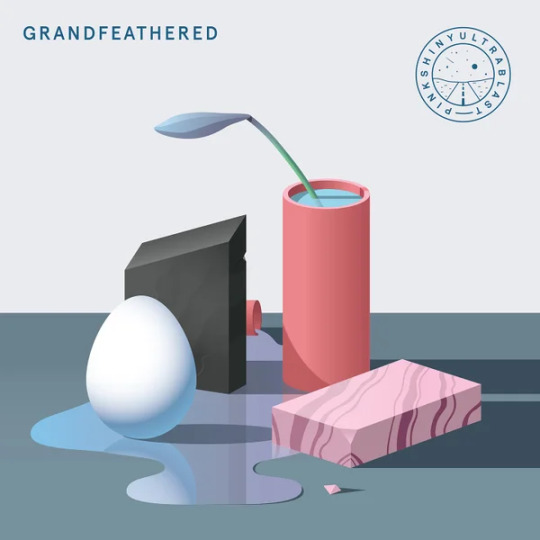
I admit that I bounced off of Russian electro-shoegazers Pinkshinyultrablast the first time I listened to them a few years ago. There was just too much going on and I didn’t really have the inclination to jump in and grab on. Operatic female vocals, noisy djenty guitar, shimmery, clean guitar, all swirl together in what is undoubtably a great record for having a tinder date IF, and I say IF, you’re willing to run a musicological acid test on them.
Whether it was listening to a bunch more music, particularly ambient music, or just changing taste now I can’t get enough of this band. They do slam from idea to idea in a song, but it’s a controlled speed- it’s not pleasant to a lot of people, but once you get yourself situated, you’ll wonder how you ever missed this band to begin with, if you’re not one of the people reading this and thinking, naw dude, I got this shit RIGHT AWAY.
The compositions on the record are, in fact, carefully considered and composed, combining noise rock with clean ambience deftly and changing up styles repeatedly throughout each song and the record. Everybody knows we can no longer control dynamics via volume in today’s world of headphone/device listening, ultramaximizing mastering, laptop speakers, etc. So Pinkshinyultrablast controls it with style. This record is definitely the more guitar-driven of the albums from this decade, with their release 2 years later being more electronic and vocal focused.
Slowdive (2017) Slowdive/My Bloody Valentine (2013) mbv
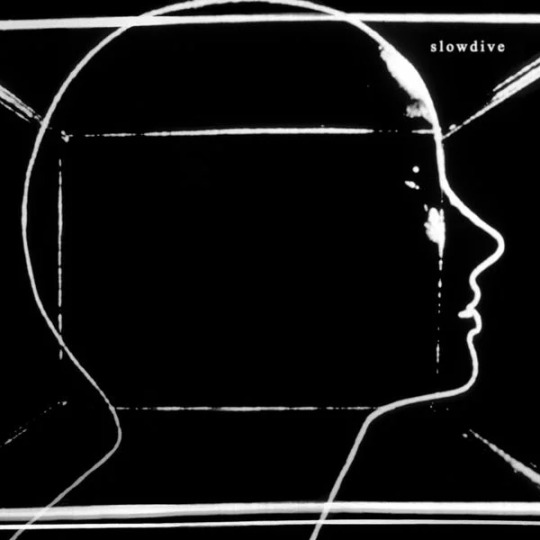

There are two bands that are credited with creating and or popularizing the Shoegaze movement during the late 80s and early 90s. Those bands are My Bloody Valentine, and Slowdive. Both of whom released albums during the 2010s. And frankly, both records are damn good for two bands that have been basically on hiatus for 20 years. Neither has really stood the test of time for me, although I listened to both exhaustively upon release.
The opening tracks of both records are absolutely mesmerizing, this slow, sexy intro is clearly the part of them that became stronger with age. The manic rock energy of their more upbeat tracks however is absent or at least forced, and I think is what keeps these from being really what I’d call strong records. Nevertheless, both albums belong on any shoegazer’s playlists both for the quality of the music as well as the nod to the progenators of the genre we love so much.
Time n Place (2018) Kero Kero Bonito
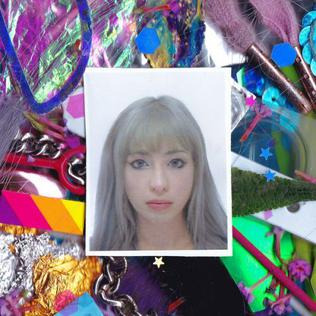
KKB was already one of the biggest indie rock groups in the world when they released this their second full-length album. Making a big move sound-wise from super squeaky clean hip hop style production to sloppy shoegaze guitars and drums, they alienated a lot of fans with Time n Place, but I don’t see how. For me, coming in for Time n Place and then going back in the catalogue to Bonito Generation, I see it as a very natural progression. As the artists become more confident and mature, it’s natural they should explore some other emotions and moods.
That said I am not the usual KKB fan. Actually at their show in San Francisco in 2018 I was probably in the top 95 percentile of being an old fart. Around me, mostly twentysomethings on the first half decade, casually doing key bumps right on the show floor, something scared old gen Xers like me, still remembering their friend’s divorced dads in cigarette boats they sold for coke in the 80s, are still too paranoid to do. The crowd definitely starting pogo jumping at the chorus to “Only Acting” a grungy, poppy metaphor between acting on stage, and being young and in love.
Right after that, “Flyaway“ is the upbeat shoegazey manic anthem that really got me sucked into the band to begin with. Combining fuzzy guitars that are more reminiscent of Japanese rock bands of the 00s than shoegaze with a crystalline clear melodic vocal line from Sarah, this is the track where I grab a handful of dirt from my dying hill, and say if you don’t like this song, you don’t like the band, the record, or my musical taste.
Miserable Miracles (2018) Pinkshinyultrablast
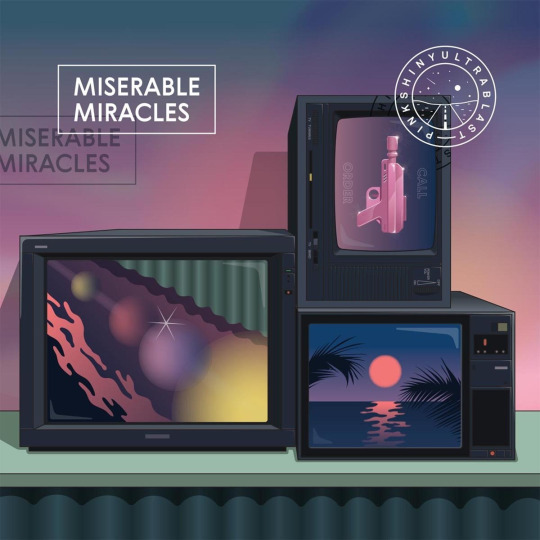
Reinventing themselves record by record, Pinkshinyultrablast keeps on the cutting edge and doesn’t make a habit of anything. Miserable Miracles is more electronics driven, lead and pad synthesizers bringing in the music with their trademark soaring, operatic vocals. Guitars are present as well, but heavily stretched with cathedral reverb and long delay. A smoother sound than Grandfeathered, but well-poised to issue a majestic, meditative prayer such as “Find your Saint”, my favorite track. Like walking into a Germanic church on Sunday, the vocals rise to the ceiling forcing you to look up at the light breaking in through stained glass synthesizers. At about 100 seconds, all of the pieces drop in together to lift you into wherever it is you are going. “I used to talk- about it” brings the heavenly outro to bear, one of the most powerful musical moments of the decade.
Astronoid (2019) Astronoid
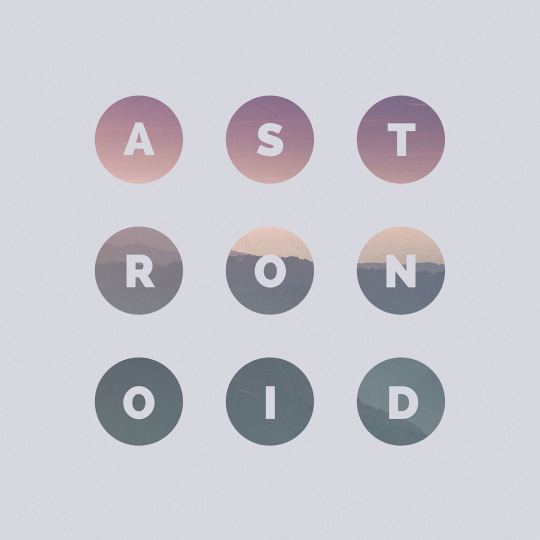
I am part of a few music groups on Facebook, and one of them mentioned this band, calling them “Dream Thrash”- a combination of dreampop and thrash metal. I’d say its more thrashgaze, with heavy effects/djenty guitar and the more whispery vocals than are a hallmark of the shoegaze genre, not the clear pop produced vocals that are the hallmark of dreampop.
That out of the way, this is possibly my favorite record of 2019. The opening track, “A New Color”, brims with energy and hopeful optimism and replaced Road Eyes as my airplane take off song. Right around 3 minutes in, when the plane is airborne and gaining climbing u to cruise, when we’re often breaking through the clouds, comes in possibly my favorite guitar solo of all time. On this record, Astronoid are unquestionably uptempo metal yet somehow at the same time being slow-changing enough to carry the emotional weight of shoegaze. The second track, “Dream in Lines”, is an aggressive, more metal-informed rocker, and the third is a power ballad that absolutely sealed the deal for me in terms of loving this album.
Other high points include the uptempo thrash jam “Breathe” and “Water”. Again infusing the metal, djenty mute strum guitar with soaring vocals and heavy backing harmonics, this record continues again and again to deliver head-banging jams that touch and heal a deep sadness in the soul. “Water” is a darker exploration, starting with a heavy chunky two-guitar & bass instrumental, virtuous breaks, and expansive echo and reverb. The band sounds like they are playing in the middle of an interstellar arena, fists human and alien in the sky.
The album sticks the landing with the penultimate track “Beyond the Scope”. This incredible song starts slowly, but upon reaching a turn, goes double-time as the melody and music climbs in pitch at 100 seconds in. This transition takes us into a greater urgency, with sustained, over-flying guitar notes keeping the harmony rich and complex.
Then, the beat drops out and a single guitar chord rings- “My hands are on my ears/They won’t stop ringing” smashes into your brain and your heart. Then again, the building section- “Feeble-minded/I can not decide/in my world, now I know/there’s no such thing as dying/so leave with a goodbye” and into another build and back to the chorus-
“My hands are on my ears/they won’t stop ringing”. I don’t think any lyric can better express the decade than that. If it were somehow possible for this album to end on this song, it would be at the head of this category.
Everything Starts to Be a Reminder (2019) Echodrone
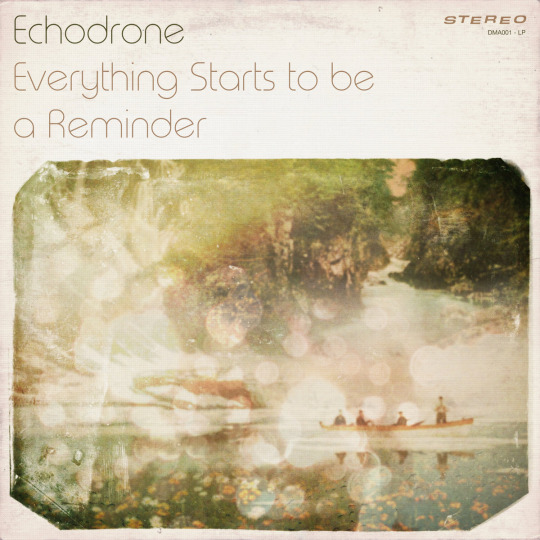
As a former musician, I have a lot of friends who are musicians. I am very brutally honest about my feelings in music and that can make it awkward to have to comment on a friend’s hard work. Echodrone’s latest record made this very easy- the record is simply amazing. Echodrone’s earlier records bounced off of me a bit, but this one has just the right mixture of drone-drenched empty space, ethereal vocals, emotional anguish and euphoria, and a strong connection to the last 10 years in my mind. The tracks are named after the four seasons, starting with Winter and ending with Autumn. Interestingly, the tracks do not really stand out as being separate in my mind, much like how you cannot easily separate a season from another season in the same year.
“Winter” explodes with an epic, cymbal-laden meditation, that continues to grow and grow and expand, then finally becomes quieter, more melodic, and less drony in the second half of the 18 ½ minute song.
“Spring” features a finger-pick echo guitar interspersed with a beautiful co-ed vocal line guiding us down a pathway of different melodic and harmonic ideas. It then enters into a several-minutes long jammy contemplation that is utterly ecstatic to me- synths layered with effects-laden bass and more echo guitar into a full stop.
The best song on the record, “Summer”, begins with a vocal sample into a more or less straight-ahead rock and roll jam. This gives way to a downtempo effects section, then at right after 4 ½ minutes, gives way to a sound I can only call Olympian in hugeness. Fuzz bass, echoing guitars, and multilayered female vocals create this trance-like atmosphere that is rarefied and deeply marked with potent and everchanging imagery at the same time, like cream on top of coffee.
The sound continues to change and becomes quiet again once again with echo guitars carrying the music through. Back to a rhythmic return at 12 ¾ minutes. A synth flute melody flies over the whispered vocals, complex drum patterns- an opine to the end of life’s summer, the bitter sweetness of being old enough to not be hurt anymore by unlikely things failing to fly.
Shoegaze Album of the Decade:
Sunbather (2013) Deafheaven

A single distorted guitar chord progression holding several notes through the chords for changing harmonics, exploding into double kick and even more guitars, into black metal screaming- this is the unmistakable beginning of Sunbather by San Francisco black metal band Deafheaven.
Due to its downtempo sections, overall distorted and layered production, and emotional scope, this album is loved not just by black metal fans but also by shoegaze fans such as myself. It is a perfect example of a successful crossover- not anticipated or forced in any way by the creators- but it just happens to work on so many different levels.
There are really only four songs on this record, the tracks in between them are much needed interludes. Something all Deafheaven songs do very well is compositioning. These tracks play out, in a way, like classical pieces, with many different sections, transitions, themes, changes, openings, closings, callbacks- it’s so incredibly dense and accomplished that you can listen to this album for weeks on end and still be surprised.
“Dream House” is the blazing opener of the record and puts on display everything we love about every song on here. To make this song the first track is insane, simply because of how over-the-top insanely powerful it is. After a brief interlude of just picked echo guitar, a single chord strum, the entire band comes back in a beat later, and this isn’t even the most emotional part of the song. That’s going to be at 7 minutes, 20 seconds in “I watched/It die!!!” screeches the vocalist as a guitar ostinado plays over the key notes that have been presented throughout the song in brutal crystal clarity. Then at 8 minutes- the vocalist and guitar break down, screaming and double picking guitar notes. It is difficult not to cry at this ending- and this is only the first song on the record.
“Sunbather” is both the title track and the album’s dark heart. Thrumming with a complex beat from the start, the other instruments are layered over this like a tangle of vines across an iron fence. Skillful use of double kick and drum fills keeps the band on target as we get to the breaks and turnarounds. The cymbals and guitars swirl creating complex patterns. Listening to this song from far away with extremely poor speakers would sound like static- similar to how Jupiter looks like a pale gold smear- turn up the volume a little, get a little closer, and you see the rich, threatening complexity of the swirling clouds of music and emotion. The song ends with a slow section about ¾ of the way through the 10 minute piece. An unforgettable echo guitar line plays sparsely over drums- invoking a Cure-like gothic sensibility. Then the band comes back in, playing the same melody and expanding upon it, a lighting bolt magnified to a thousand forks and twists going in all directions. It is the melodies at the end of Sunbather that were stuck in my head, unforgettable, after listening to this record. Unlike Dream House, this song ends on a down note, a question- the rest of the album is to give an answer, and incredibly, you will not be disappointed.
“Vertigo” is the longest song on the record at 14 ½ minutes, a blazing, minor key rocker that is meant to emotionally drag us down as far as we can go after Sunbather. The ending of the song invokes the Beatles “She’s So Heavy” before heading into “Windows” an ambient and spoken word piece featuring a drug deal gone bad- unquestionably a node to The Tenderloin, one of the more drug-laden districts in San Francisco and likely location of the band’s rehearsal studios.
Into “The Pecan Tree”, a song that has an seemingly impossible task: To somehow stick the landing of an extremely powerful and emotional record. We are looking for something coming into this track, but we are not totally sure what it is. We need something, but we can only follow the lights. The song opens up with insane double-kick guitar madness, 2 step rhythm, and then at 1:20 we see a glimpse through the storm, a hole of blue, that we can make it to, if we keep on going. Keep on going. Keep on walking. Smashing, swirling guitars and screams return, our view obstructed. Everything seems to be going at maximum at the end of this first section of the song.
At just after 3 minutes, the sonic assault finally begins to slow down, a march tempo into double kick continuous cymbals, back to march tempo, then, at 4 minutes 19 seconds, only picked echo guitar heralds us into the second section. The star of this section is a piano ostinato combined with the echo guitar, with a second guitar playing playful melodies over it. This is the starry night we can now see that the storm has cleared- this is the most optimistic and life affirming music on the record. A found audio recording of a detuned radio signals the ending of this section.
Eventually, this music fades just before four metal beats brings us to the conclusion- an octave-fingering guitar line and screeching vocal that is in my view one of the most awesome emotional turnarounds that I have ever experienced musically. The remaining outro sums up the entire record- life is big, difficult, unknowable, chaotic. Great albums stick the landing- and this ending does so, with incredible energy, on a record that did not even need it. Sunbather. One of the greatest rock records of all time and one of the very few of those albums to come out now, just about half a century after the 60s.
Post Punk Revivalists: The king of indie rock genres in the 00s, post punk was largely set down at the end of the decade with the major acts of the decade releasing milquetoast or downright laughable fare (are we human, or are we dancer?). However, post punk exploded back onto the scene in 2012 with The Money Store by Death Grips. Some returning groups from the 00s did end up releasing fantastic records, Roma 79 and Daughters being my favorites.
Cardinal Star (2014) Roma 79

I discovered north San Francisco bay area band Roma 79 through their single from the 00s, “Gold”, a sort of heavy, post-punk rocker with a few-thousand views on Youtube. I was very surprised when they reunited and recorded this followup album, which was one of my favorite records of 2014. Featuring a good amount of synth and dreampoppy guitar lines, the main standouts are the vocals and the brilliant drumming, which is a hallmark of great post-punk records of the 00s such as Fever to Tell or Turn On the Bright Lights. The strongest single on the record, “Seventeen”, features a complex drum lines, interlaced with vocals and synths. The song slowly builds up in emotional intensity and drops in layers of vaguely Phil Collins-esque drums and backing vocals, blossoming into a powerful meditative love song. “I’ll wait for it with you.” The final song on the record, is almost an answer to this track, closing the record on a strong point.
You Won’t Get What You Want (2018) Daughters
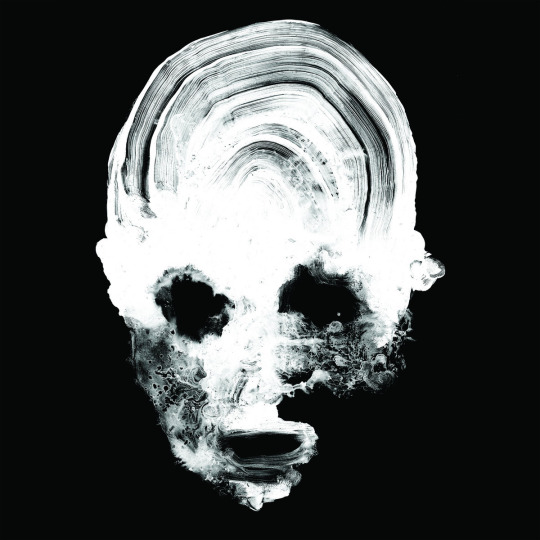
Daughters is another post-punk band that returned to release a followup nearly 10 years later with 2018’s “You Won’t Get What You Want”. Like all great post punk records, there are a number of characters in this room, and they all can be heard, each having their moments in the spotlight and their moments in the shadows.
One such character is the drums. A crushing combination of live and multitracking effects create a rhythm that provides both the constant heartbeat required by driving rock and roll based music, but also the texture, the complexity, that we seek out in the genre. Lots of tom toms used to keep the beat as opposed to cymbals, practically no hat. Invoking Killing Joke, except when they don’t want to right away, but bring it in later.
Another character is the vocals. Spoken word/sing song type delivery, where the mood and the words and more important than the melody. Lyrics invoke isolation, depression, contraction, abandonment, decline. It would almost be enough with just that, these drums and vocals- but this will also be added by another character, the music. The music seems to be generated mostly by guitar and bass, but there are clearly some synthesizer elements as well, used sparingly and to great effect. I can’t really describe the guitar tone, I would say, it shimmers, but not in an enlightening way. It’s like flashes in the dark, disorienting more than illuminating. The sound is like wood coming off a circular saw. It’s definitely this guitar sound that draws people into this record. All elements are moody, dark, aggressive, but it’s the guitar that really lays down flashes over the blackness.
“Satan in the Wait”, one of the best single tracks on the record, features an off-balance drum beat, carried by toms, and an air-raid siren like guitar sound. A throbbing, distorted bassline in time with the kick drum. At 1:30 in we are given a guitar riff that is beautiful and invoking of a banjo, lending a sensation of urban, southern gothic emotions. Horror film soundtracks come to mind, a combination of unsettling ambience and clear, unforgettable melodies. “Their Bodies are open” the chorus goes, making me think of world-ending events, a transformational death as seen in Arthur C. Clarkes Childhood’s End.
Another of my favorite tracks, “Daughter”, begins with a “bela legosi is dead” kick and snare rim drum beat, possibly electronic, along with a shimmery, surf-rock toned guitar riff. As the song proceeds, more elements are dropped in, and the drums are of particular note here, at 1:23 or so, they drop into a complex beat involving toms, cymbals, and snare. At 2:05 they drop in a clear guitar riff on top of raw noise, building to a climax with the vocal “There’s a war!” At this point, the noise drops out, just a clear guitar riff reminiscent of “Satan in the Wait”, drums coming in at 3:15 or so are particularly impactful.
The final track, “Guest House”, opens on a nearly unbearable sonic assault, the lyrics invoking somebody trapped outside of a bomb shelter during an apocalypse. Once again the gap between unbearable noise and beautiful melody is bridged, as the final dissonant chords give way to deep, harmonic, peaceful orchestra swells.
Post Punk Album of the Decade:
The Money Store (2012) Death Grips
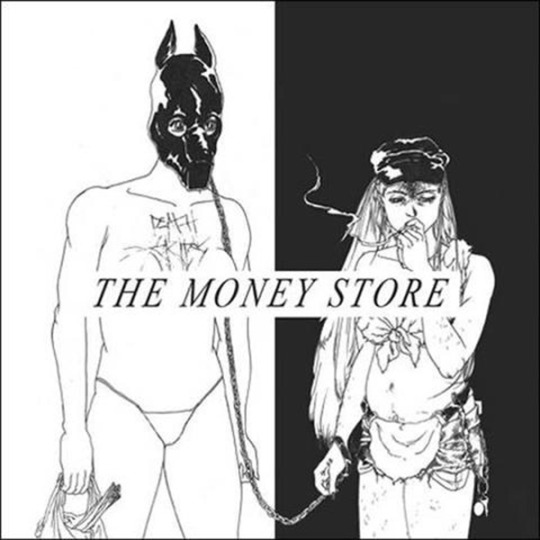
The first time somebody played “Get Got” for me, it was during a really chillwave phase in my music taste and I was completely lost, and didn’t really understand what people saw in Death Grips. I was intrigued enough though, and circled back on some tracks from Exmilitary, their prior record. The more laid back tone and empty space present in tracks such as “Culture Shock” kept me interested enough to give The Money Store another shot a year or so later.
As my interest in chillwave started to fade, and I sought more emotional substance to my music, I returned to the Money Store, and was hooked. Each track is a relentless blast of aggressive drum beats, synthesizer driven melodies, and of course the unmistakable rap vocals of MC Ride.
A strong comparison for me, is between this record, and Joy Division’s second and final record, “Closer”. Relentless beats, but never getting boring, always inventing new rhythms to cast a texture over the musical landscape. Short, fast songs, transitioning from one beat and tempo to the other, never giving you a chance to catch your breath.
The music is highly influenced by hip hop, appearing to be a chopped and cut style, with synthesizers combined with production on the vocals, adding vocals, filter sweeps, reverses, etc- so much energy and craft went into creating what is on its surface very simple music- drums, vocals, and production. Standout track “Hustle Bones” does a fantastic job of expressing what is so great about every song on this record. Everything barely makes sense, but then it all comes together in a singular moment that anybody can nod their head to.
MC Ride’s best is on display in the classic hit, “I’ve Seen Footage”. In his relentless, attacking rap style, he tells us the story of watching gore or wtf videos from reddit or 4chan (or Stile Project if you’re really old like me)- describing what he’s seen, and then underscoring that with the chorus, “I stay noided”- the character Ride creates is deeply anxious and paranoid, while at the same time being insatiable in the quest for knowing more, something I believe is nearly universal to the experience of the internet-informed human, a phenomenon that would later in the decade lead to diseases thought dead brought back by anti-vax movements, and the election of conspiracy theorist and popularizer Donald Trump as president of the united states.
And that’s the formula to each track on Money Store- working around something more or less literal, Ride’s poetry brings us into the dark state the world was only beginning to enter at the start of the decade.
Closing track “Hacker” opens with a recording of Ride, yelling, presumably at a concert “No ins and outs!!! You come out, your shit is GONE”, then into a 4-on the floor dance beat to end the record on an absolute banger. The music, carried by the beat and Ride’s systematic delivery, is left to its own devices, with glitchy, cut-off synth arpeggios, everything getting out of the way of the beat. “Having conversations with your car alarm”, “you speak with us in certain circles, you will be dethroned or detained”, and “Gaga can’t handle this shit” are some of the lyrical gems that Ride has saved for last here, closing out a post punk record that stands alongside Closer or Turn on the Bright Lights as one of the best of all time.
6 notes
·
View notes
Text
They call me kitty🐾
[Jikook Social Media Au]
Part 27: Hunt >> Part 28: Monster
Jungkook is a bratty college student, who stumbles through life, trying to find his way. He is attractive and he knows it, so he is used to getting whoever he wants. Until a certain cute boy walks into his life with swaying hips and fluttering lashes, who seems completely unimpressed by Jungkook. However, being the stubborn boy that he is Jungkook refuses to give up just yet, not knowing that with that he has already become a figure in Jimins game of life.
(A/N: Just a short warning, this contains a bit of violence/ threat of violence, things that come with a kidnapping)
Jimin was angry, no furious. He was filled with so much rage, it was burning under his skin like a volcano that was ready to burst. But he couldn't lose control now, he had to stay somewhat calm and collected. They needed a plan, he had to lead his people. There was no time for anger tantrums. He took a deep breath, and another one, and another one before he finally pushed open the heavy metal doors to their conference room.
He was greeted by bright light but the sunglasses on his nose protected him from flinching. He pushed his hair back and walked towards the big table in the middle of the room. His three best men were already seated around it, all of them were staring at him now. He knew that at least Yoongi was already questioning him. Joon would probably be understanding enough and Tae always took his side, just out of principle but still. It was driving him insane but he couldn't disappoint. If word spread about him risking the business for a boy toy he'd lose all loyal partners.
"Don't fucking look at me like that. Show me the cameras, Yoongi." He demanded. His voice was already strained from his previous night out. He was fucking tired but the burning under his skin didn't let him rest. Yoongi reacted quickly. On his chair he rolled over to a laptop that was connected to several screens that decorated the wall to the left. Jimin flopped down on the chair at the head of the table and lifted his legs on it, his eyes focused on the screens. Multiple camera views appeared, some were completely black, some only showed a grey flickering but more than enough showed different rooms. Jimin could make out three rooms that didn't seem to have a purpose, in two rooms he saw just a bunch of men lounging around. There were two lab rooms where obviously the drugs were made. But all those weren't of any interest for Jimin. His eyes were trained on four rooms. His hands balled into fists.
Two of those rooms were weapon warehouses as it seems, all kinds of guns, riffles, even granates were stocked up on rusty tables and shelves. Then there was a room in which five half naked women were cowering on old, crusty mattresses. The cameras were pretty shitty and the view pixelated but Jimin could see enough to know that these women were most definitely not there on their own free will. The last room showed a dead body as Jimin supposed, he was laying on the floor in an unhealthy angle and not moving at all.
“There were two before.” Yoongi said as he saw what Jimin was looking at. “But they already cleaned one up. I don’t even wanna know what they hide in the rooms with the broken cameras.” Jimin flicked his tongue and stood up. He pulled pink leather gloves and slowly put them on.
“Well,” he said, his voice barely more than a growl. “Let’s go hunting.”
+++++++++++++++++++++++++++++++++++++Meanwhile
Jeongguk whimpered and struggled against his restraints. He can’t believe this is really happening, it feels like a nightmare but whatever he does he can’t wake up. Thick, rough ropes were chaining his arms to the back of the cold metal chair he was sitting on. His ankles were chained to the legs of the chair as well. Every time he tried to move or wriggle around it did nothing but cut deeper into his skin. His whole body was shivering, not only from fear but also the cold. He was only wearing grey sweatpants and a white T-Shirt and the air in this--- bunker or wherever he is, is humid and icy.
He doesn’t really understand what is going on, what these people want from him. He can just guess that it has something to do with Jimin. Would Jimin even search for him? Would he even care? Jeongguk has no idea what he is for Jimin and the thought that the older might leave him here to die hurts more than the ropes cutting into his skin.
It’s so dark that Jeongguk can’t see anything at all, the only sound is his heavy breathing and occasional whimpers that resonate from the walls around him. He doesn’t know for how long he already sat here. For him it felt like hours but it might as well just have been minutes. Not knowing what he is waiting for is the worst of all. Will they kill him? Torture him? Just leave him here forever? His head felt ready to explode, probably from where those guys hit him unconscious to stop him from putting up a fight while they dragged him out of the building. He wondered if any of their neighbours saw anything and maybe called the police. There was this tiny spark of hope that someone would come and save him. He would try to escape but he couldn’t move at all or see anything.
Jeongguk was feeling dizzy, he was drifting in and out of consciousness when suddenly clicking noises came from the other side of the room. His heartbeat picked up and a new wave of adrenaline rushed through his body as a door opened. The bright light that suddenly flooded the room hurt his eyes so bad he had to scrunch them shut and tried to turn his head away from the light but a hand suddenly fisted into his hair and pulled his head up. He blinked until his eyes got used to the light and he looked into the face of a man who looked slightly older than him.
“Are you finally awake?” The man snarled and released his hair. The man took a step back. “You look pathetic, I wonder what Kitty sees in you.” Jeongguk gulped. So it really was about Jimin. He looked around the room, now that the light allowed him to see where he was. It was a bare room, the walls cut into rough stone. some rusty pipes run across the wall next to him. In front of the door stood three more men, Jeongguk could clearly make out the guns that were tucked into the front of their pants. He gulped and looked to the man in front of him again.
“Do you know why you are here?” The man asked. He had poorly dyed blonde hair and a big scare that went from his left cheekbone down to his neck. He had a skull tattooed on his temple and the word dragon curling around his neck. Jeongguk weakly shook his head. He has never been so terrified before in his life. The man pulled a chair to the middle of the room, in front of Jeongguk and sat down on it. He threw one leg over the other and just stared Jeongguk down for a while. Jeongguks eyes nervously jumped around the room. What would they do to him.
“You got yourself involved with the wrong people. You should have kept your dick to yourself.” Jeongguk wanted to run away and hide so badly. He felt like a child all over again.
“You see, Kitty and I, we have a long, long history. I made him to who he is today, everything he achieved was because of me. He owes me his life. Can’t say I appreciate that he tried to force me out of the city. He is an ungrateful, little piece of shit." Jeongguk wonders how that connects to him and if it would be a good idea to ask. Just what do they want from him? But the man already continues to speak.
"But of course, I'm not letting some C-class slut take over my city. I admit that I struggled at first, but that was only because he stole me everything. Now, I'm just getting back what's mine. For that, however, I need to get rid of that bastard. And that's why you are here, you are the mouse in our little game. The bait for the bad kitty." The man sounded so ridiculous that Jeongguk would have scoffed if he wasn't so terrified right now.
"Kitty likes to pretend that he is in control and that nothing gets to him, but I know him. I’ve seen him at his worst. In reality he's just a poor, insecure, pathetic little piece of trash. I'm sure he'll come for you, we'll just have to wait here. And once he and his lapdogs arrive I'll make him watch as I let each and everyone be killed and you'll be the last." Jeongguks blood froze. "Oh I can't wait for that face of his, can't wait to see those broken eyes again as I take everything of him that matters to him." The man smiled to himself, he truly looked like he was looking forward to it. As if he was talking about his birthday party and not destroying somebody else's life. Is that really how it's gonna be? Will they really make Jimin watch as they kill him? Another wave of panic washes over him. He's only twenty, he can't die yet. There is so much he still wants to do, so much he thought he had time for. Adrenaline rushes through his veins and he, once again, tries to struggle against the ropes. The man sees and laughs.
"Don't even try, there is no way you can get out of those." He says. "Why don't we talk a bit, huh? I know that you and Kitty spend a lot of time together, you have to know some things. If you behave and cooperate, I'll kill you nice and quick. A shot in the head, boom, over. No pain, nothing. However, if you'd rather be a little shit--- just know that I can be really creative in ways of making someone suffer. It's on you."
And that's that. Jeongguk sobs. He thinks those action movies where the protagonists stay cool and collected in such situations are dumb. No one can stay calm in this kind of situation. Jeongguk has to think about his family and friends, all the people that matter to him and that he can never see again. He hasn't talked to his parents in a while, they aren't on the best terms but he is sure that his mother will be devastated. He thinks about Seokjin and Hoseok, they will be so mad. They warned him and he didn't listen, he knew Jimin was bad news but he ignored it. He didn't think it would come to this. Tears and snot drip down his face but since his hands a tied he can't wipe it away. A tiny gasp escapes him when all four men in the room start laughing at him, right into his face.
"Look at that motherfucker, look how he's weeping like a baby. You and Kitty really are one hell of a duo." The man in front of him wheezes. Jeongguk never felt more humiliated in his life. His body is still shaking but those men just keep making fun of him. Suddenly his fear turns into fury. How fucking dare they. Who gave them the fucking right to walk around and play with other people's life's? Jeongguk presses his jaws together and balls his hands to fists. He doesn't even think about it when he spits on the ground, right in front of the man's feet. The laughter stops within second and something dark and dangerous lights up in the guys eyes.
"Oh?" He made, challenging. "Are you already done crying? Gotta say something, huh?" Jeongguk glares at him angrily and presses his lips to a thin line. The man lifts his hands and it comes down to Jeongguks cheek with a loud slapping sound that echoes through the room. Jeongguk can taste blood in his mouth but he refuses to give him the satisfaction of whimpering again.
"Don't fuck with me, dude. Unless you wanna experience real pain." He gruffs into Jeongguks face and gives his head another shove.
"Come on, what do you know about Kitty, huh? What are his dirty little secrets? What is he scared of? Where does he keep his money?" When Jeongguk doesn't answer the man slaps him again.
"If you know what's good for you, you better start talking." Even if Jeongguk knew anything -which he doesn't- he'd never tell this guy anything. However, just seconds later his blood runs cold when the man says.
"Yo, Jason, gimme your knife."
...
(A/N: Whoops, cliffhanger anyone?)
#bts#fanfiction#bts fanfiction#social media au#jikook social media au#jikook#kookmin#park jimin#jeon jungkook#kitty gang au#kitty gang au 27#ggukienet
25 notes
·
View notes
Note
Even though Sam has had a storyline in S11, S12, S13, and S14, I feel that it is lackluster compared to his storylines in S8 and earlier. In S8 and earlier, he had so much interaction with the supernatural, and he was physically and mentally pushed so much farther than he has been in these last few seasons. I really miss how his stories used to be. So my question: do you think Sam will get a nice mytharc/storyline in s15???
I’ve enjoyed the more human-oriented Sam storylines of s11 thru s14 because it avoids the problems that have been plaguing popular long-running tv shows: rigid central protagonist. I’ll get to that later.
See, somebody has to have a character arc and the showrunners clearly decided it wasn’t going to be Dean, and it’s for good reasons. First, Dean is the support protagonist and the role of the support is to define the relationship to the main character, which helps move the stories forward. Second, the showrunners were trying (and mostly succeeding) to avoid the problem of “evolving characters who surround a protagonist of frustrating rigidity”. This article “As TV evolves, a glaring problem of characters who don’t change” explains the problem of rigid central protagonists. Critics and viewers were frustrated that Mad Men didn’t let Don Daper evolve, he started the first season drinking and carrying on with young brunettes and ended the final season with drinking and carrying on with young brunettes. In 24, Jack Bauer had bested so many villains over 8 seasons that fans counted and mocked Jack’s on-screen kill count at 265 dead bodies over 8 days. To those that complained Sam doesn’t get many wins (on-screen kills), now you know why the showrunners held back because you can only stretch suspension of disbelief for so much over 300 hours before it gets to the breaking points.
I really miss how his stories used to be.
Besides avoiding the rigid central protagonist problem by moving beyond “how his stories used to be”, Supernatural’s unprecedanted 14 years run allows Sam’s character arcs to have three well-known story arcs instead of one:The Change Arc, The Fall Arc, and The Growth Arc.
The Change Arc is typical hero’s journey where the protagonist change from an unlikely fellow into a savior and hero. This transformation is usually radical, and despite some inner strength that was “always within him”, pretty much all else about the protagonist changes drastically by the end of the story. (season 1, 2, 3, 5)
The Fall Arc is a tragedy that follows the protagonist as he dooms himself and/or others, and declines into insanity, immorality, or death. (season 4, 7, 8, 9).
The Growth Arc, also called character development, is when the protagonist overcomes an internal opposition (weakness, fear, the past, etc.) while he faces an external opposition, and as a result, he becomes a fuller, better person and upgrades to Protagonist 2.0. (season 5, 6, 11, 12, 13, 14)
So you can see why I’ve enjoyed the later seasons as much as I did the earlier seasons, Sam is allowed to evolve but like everything else in life, it is not a linear progression, there are one step foward and two steps back because life happens.
do you think Sam will get a nice mytharc/storyline in s15???
I think the last season will combine the Change Arc with the Growth Arc (Sam’s metaphoric struggle with God triggers an upgrade to Protagonist 3.0).
Update:Season 15 just concluded with the completion of Sam’s Hero Journey arc. Sam’s change and growth is returning to the normal world and becoming a father, continuing the Winchester legacy.
130 notes
·
View notes
Text
Into the Woods: A Five Act Journey Into Story by John Yorke; Quotes
There’s no doubt that for many those rules help. Friedrich Engels put it pithily: ‘Freedom is the recognition of necessity.’
‘You need the eye, the hand and the heart,’ proclaims the ancient Chinese proverb. ‘Two won’t do.’
Delacroix countered the fear of knowledge succinctly: ‘First learn to be a craftsman; it won’t keep you from being a genius.’
We are capable of entering any kind of head. David Edgar justified his play about the Nazi architect Albert Speer by saying: ‘The awful truth – and it is awful, in both senses of the word – is that the response most great drama asks of us is neither “yes please” nor “no thanks” but “you too?”. Or, in the cold light of dawn, “there but for the grace of God go I”.’
As Peter Brook writes in The Empty Space, ‘In the theatre the slate is wiped clean all the time.’ Drama is a test-bed on which we can test and confront our darkest impulses under laboratory conditions; where we can experience the desires without having to confront the consequences. Drama enables us to peer into the soul, not of the person who has driven his father out onto the heath, but the person who has wanted to.
Our favourite characters are the ones who, at some silent level, embody what we all want for ourselves: the good, the bad and ugly too.
‘The more successful the villain, the more successful the picture.’
‘Somebody’s got to want something, something’s got to be standing in their way of getting it. You do that and you’ll have a scene.’
‘Tell me what you want,’ said Anton Chekhov, ‘and I will tell you what manner of man you are.’
Cops want to catch the killer, doctors want to heal their patient; in truth it doesn’t actually matter what the object is, its importance is bestowed by those in pursuit.
What a character thinks is good for them is often at odds with what actually is. This conflict, as we shall see, appears to be one of the fundamental tenets of structure, because it embodies the battle between external and internal desire.
Characters then should not always get what they want, but should – if they deserve it – get what they need. That need, or flaw, is almost always present at the beginning of the film. The want, however, cannot become clear until after the inciting incident.
The crisis occurs when the hero’s final dilemma is crystallized, the moment they are faced with the most important question of the story – just what kind of person are they? Finding themselves in a seemingly inescapable hole, the protagonist is presented with a choice.
So the inciting incident provokes the question ‘What will happen’ and the climax (or obligatory act) declares – ‘this’.
As Shakespearean scholar Jan Kott noted before him, ‘Ancient Tragedy is loss of life, modern Tragedy is loss of purpose’.
‘good’ is a relative concept
Change is the bedrock of life and consequently the bedrock of narrative.
THE ROADMAP OF CHANGE
ACT 1 No knowledge Growing knowledge Awakening
ACT 2 Doubt Overcoming reluctance Acceptance
ACT 3 Experimenting with knowledge
MIDPOINT – KEY KNOWLEDGE Experimenting post-knowledge
ACT 4 Doubt Growing reluctance Regression
ACT 5 Reawakening Re-acceptance Total mastery
A well-designed midpoint has a risk/reward ratio: a character gains something vital, but in doing so ramps up the jeopardy around them.
JOURNEY THERE; JOURNEY BACK
All stories at some level are about a search for the truth of the subject they are exploring. Just as the act of perception involves seeking out the ‘truth’ of the thing perceived, so storytelling mimics that process. The ‘truth’ of the story, then, lies at the midpoint. The protagonist’s action at this point will be to overcome that obstacle, assimilate that truth and begin the journey back – the journey to understand the implications of what that ‘truth’ really means.
Stories are built from acts, acts are built from scenes and scenes are built from even smaller units called beats. All these units are constructed in three parts: fractal versions of the three-act whole. Just as a story will contain a set-up, an inciting incident, a crisis, a climax and a resolution, so will acts and so will scenes.
‘Drama is life with the dull bits cut out.’ Alfred Hitchcock
Screenwriting is showing not telling; structure is the presentation of images in such a way an audience are forced to work out the relationship between them. Stanton had stumbled upon what is known amongst film theoreticians as the ‘Kuleshov Effect’.
I want to get an abortion, but my boyfriend and I are having trouble conceiving. American comedian Sarah Silverman’s joke is built on a classic subversion of expectation. But take a look at any joke, or any scene in any drama: the juxtaposition of opposites, verbal or visual or both, is the central plank not just of showing rather than telling, but of all humour, all narrative. Something, confronted with its opposite, makes us recast our notion of that ‘something’ again.
Everyone customizes, consciously or not, everything they do.
Every decision we make or action we perform when confronted with an obstacle is a choice that reveals – through action – our personality. In every scene, remember, a protagonist is presented with a mini crisis, and must make a choice as to how to surmount it. Meeting with a subversion of expectation – a blow to their established plans – a character must choose a new course of action. In doing so they reveal a little bit more of who they are.
as F. Scott Fitzgerald put it, ‘The test of a first-rate intelligence is the ability to hold two opposed ideas in mind at the same time and still retain the ability to function.’
It was Kenneth Tynan who said ‘a neurosis is a secret you don’t know you’re keeping’.
The less back-story a character has, the more readily an audience is able to identify with them – the more we can see they’re like us and not like someone else. We may want to know more, but it’s the not knowing that keeps us watching. It allows us to fully experience the journey ourselves and actively join in the process in which a character pursues their goal, their flaw is subsumed into their façade, their need into their want, and the goal of all drama is achieved – a rich, complex, three-dimensional character appears in front of our eyes.
The three most important functions of dialogue – characterization, exposition and subtext – are all, as we shall see, products of character desire.
Good dialogue conveys how a character wants to be seen while betraying the flaws they want to hide.
Grammar, vocabulary, syntax, rhythm, sentence length, jargon or slang – when combined in a particular way, they all allow us to understand who a person is. Change one and the character changes. Dialogue isn’t just about what someone says; how they choose to say it is important too.
Exposition works when it’s a tool a character uses to achieve their desire. If this desire is confronted with opposition, conflict is generated and exposition becomes invisible. The greater the conflict, the less visible the exposition.
Silence of the Lambs screenwriter Ted Tally put the art of writing dialogue succinctly: ‘What’s important is not the emotion they’re playing but the emotion they’re trying to conceal.’
So masked desire is the main source of subtext.
Georg Simmel, the nineteenth-century sociologist, put it rather eloquently: ‘All we communicate to another individual by means of words or perhaps in another fashion – even the most subjective, impulsive, intimate matters – is a selection from that psychological-real whole whose absolutely exact report … would drive everybody into the insane asylum.’
‘No description is as difficult as the description of self.’
We watch stories not just to awaken our eyes to reality but to make reality bearable as well. Truth without hope is as unbearable as hope without truth.
Out of our quarrel with others we make rhetoric; out of the quarrel with ourselves we make poetry. - W. B. Yeats
the idea that ‘we crash into each other just to feel something’.
McGovern believed neither of the two arguments, but he’d mastered a very important principle: that whatever you believe should be tested to destruction.
As Andrew Stanton says, ‘You often hear the term “You should have something to say in a story” but that doesn’t always mean a message. It means truth, some value that you yourself as a storyteller believe in, and then through the course of the story are able to debate that truth. Try to prove it wrong. Test it to its limits.’
There is much to learn from the game of chess, whose individual engagements are all part of one long engagement seeking a condition not of adversity or conflict or defeat or even victory, but of the harmony underlying all.
Javed Akhtar, the co-writer of Sholay, the most successful Indian movie of all time, made a shrewd observation: You must have seen children playing with a string and a pebble. They tie a string and the pebble and they start swinging it over their head. And slowly they keep loosening the string, and it makes bigger and bigger circles. Now this pebble is the revolt from the tradition, it wants to move away … The string is the tradition, the continuity. It’s holding it. But if you break the string the pebble will fall. If you remove the pebble the string cannot go that far. This tension of tradition and revolt against the tradition … are in a way contradictory, but as a matter of fact [are] a synthesis. You will always find a synthesis of tradition and revolt from tradition together in any good art.
just why fairy tales hover on the edges of cruelty; it’s about how ‘baddies’ are the products of inner conflict
‘All of us are potential villains,’ the legendary Disney animators Frank Thomas and Ollie Johnston once remarked. ‘If we are pushed far enough, pressured beyond our breaking point, our self-preservation system takes over and we are capable of terrible villainy.’
Storytelling, then, is the dramatization of the process of knowledge assimilation.
Like much that is briefly fashionable, it didn’t survive because it had nothing meaningful to say. A greater test of worth must be whether a work lasts for more than a generation.
an observation from Robert Hughes: ‘The basic project of art is always to make the world whole and comprehensible, to restore it to us in all its glory and its occasional nastiness, not through argument but through feeling, and then to close the gap between you and everything that is not you, and in this way pass from feeling to meaning.’
‘Art consists of limitation. The most beautiful part of every picture is the frame.’ G. K. Chesterton
8 notes
·
View notes
Text
Somebody asked me for some anime recs. I asked them what kind of genres they’re into but I’m not getting a reply, so here are just some general recommendations for good stuff to watch.
I assume they meant new anime so I’m only focusing on those.
Made in Abyss (2017)
(warning for Body horror, violence and gore)
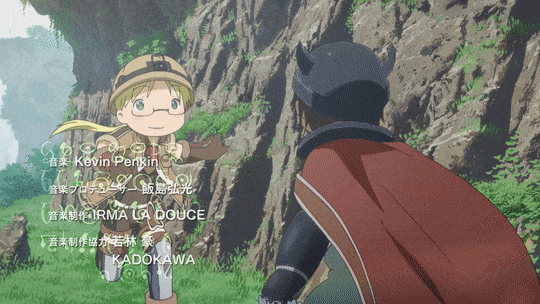
The Abyss—a gaping chasm stretching down into the depths of the earth, filled with mysterious creatures and relics from a time long past. How did it come to be? What lies at the bottom? Countless brave individuals, known as Divers, have sought to solve these mysteries of the Abyss, fearlessly descending into its darkest realms. The best and bravest of the Divers, the White Whistles, are hailed as legends by those who remain on the surface.
Riko, daughter of the missing White Whistle Lyza the Annihilator, aspires to become like her mother and explore the furthest reaches of the Abyss. However, just a novice Red Whistle herself, she is only permitted to roam its most upper layer. Even so, Riko has a chance encounter with a mysterious robot with the appearance of an ordinary young boy. She comes to name him Reg, and he has no recollection of the events preceding his discovery. Certain that the technology to create Reg must come from deep within the Abyss, the two decide to venture forth into the chasm to recover his memories and see the bottom of the great pit with their own eyes. However, they know not of the harsh reality that is the true existence of the Abyss.
Pros:
Ghibli artists working on the backgrounds and environments
likeable characters
crushing atmosphere
incredible world building
Really compelling mysteries
Very emotional
Cons:
The manga its based on has a lot of lolicon bullshit. But the anime has doneits best to either remove or downplay those elements as childhood innocence rather than the author being a creep
Ends without clear answers as we have to wait for season 2
Not for you if you dislike violence or body horror
That Time I got Reincarnated as a Slime (2018)

Thirty-seven-year-old Satoru Mikami is a typical corporate worker, who is perfectly content with his monotonous lifestyle in Tokyo. In the midst of a casual encounter with his colleague, a knife weilding maniac attacks them. Satoru, in shielding his co-worker and his co-worker’s new girlfriend, is fatally stabbed, and dies.
And then he wakes up again. But now, in the body of a blob of slime. In doing so, he acquires newfound skills—notably, the power to devour anything and mimic its appearance and abilities. He then stumbles upon the sealed Catastrophe-level monster "Storm Dragon" Veldora who had been sealed away for the past 300 years for devastating a town to ashes. Sympathetic to his predicament, Satoru befriends him, promising to assist in destroying the seal. In return, Verudora bestows upon him the name Rimuru Tempest to grant him divine protection.
With a goal now, the newly named Rimuru sets out to explore this fantasy world, stumbling into situations where other people need help, and since finding ways to live peacefully is much less hassle, Rimuru does his best to settle conflicts and help people to get along. Mostly because he’s got nothing better to do.
Pros:
Likeable, chilled out protagonist who acts and behaves like an adult
Not the average wish-fullfilment harem-in-disguise type stuff you expect from the average Isekai show
Characters focusing on trying to help each other and be kind without coming across as cheesy or unrealistic
Fun powers and “how are you gonna fix this mess?” situations
Cons:
occasional anime tiddy
Mob Psycho 100 (2016)
(If you’ve seen season 1 already then watch season 2)

An Eighth-grader Shigeo "Mob" Kageyama is possibly the most powerful psychic on earth. Which is the only thing he has going for him which, in his opinion, isn’t much. Due to his powers going crazy if he gets overwhelmed by his emotions, Mob has spent his life suppressing his feelings, both negative and positive. As a result, however, Mob is an extremely socially awkward and shy person who struggles to connect to people.
The story follows Mob as he tries to find ways to better himself as a person, aided by the fake psychic Reigen who both uses Mob’s real psychic powers to exorcise ghosts, but also uses his fake con-man skill of charming people and being a smooth talker to help people fix their problems rather than have them rely on a psychic for help. He also acts as a mentor to Mob, not on how to be a better psychic, but on how to mature into a good, capable person. Because according to Reigen “Having psychic powers is just a skill. Some people can run fast, some people can can sing well, some people are good at studying, some people are funny, and some people have psychic powers.”
Now if only the assortment of Cult leaders, Ghosts, Secret organizations and Powerful psychics trying to take over the world could leave him alone.
Pros:
A subversion of the “I must get stronger!” shounen story where the character is already the strongest and needs to focus on being a better person instead.
Probably the best animated show to come out in years
Good uplifting morals
A wacky off-beat art style and sense of humour
Genuinely complex and 3 dimensional characters who are likeable
Really relatable in many ways
Cons:
I can’t think of any tbh
Then we have anime I have on my “to watch” list and come highly recommended but I haven’t seen yet. But I want to recommend them anyway
A Place Further Than The Universe (2018)
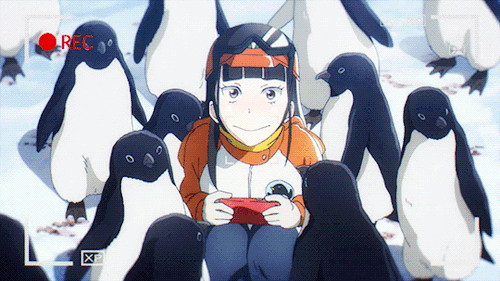
a “Cute Girls Doing Cute Things” show.
Filled with an overwhelming sense of wonder for the world around her, Mari Tamaki has always dreamt of what lies beyond the reaches of the universe. However, despite harboring such large aspirations on the inside, her fear of the unknown and anxiety over her own possible limitations have always held her back from chasing them. But now, in her second year of high school, Mari is more determined than ever to not let any more of her youth go to waste. Still, her fear continues to prevent her from taking that ambitious step forward—that is, until she has a chance encounter with a girl who has grand dreams of her own.
Spurred by her mother's disappearance, Shirase Kobuchizawa has been working hard to fund her trip to Antarctica. Despite facing doubt and ridicule from virtually everyone, Shirase is determined to embark on this expedition to search for her mother in a place further than the universe itself. Inspired by Shirase's resolve, Mari jumps at the chance to join her. Soon, their efforts attract the attention of the bubbly Hinata Miyake, who is eager to stand out, and Yuzuki Shiraishi, a polite girl from a high class background. Together, they set sail toward the frozen south.
The Promised Neverland (2019)
(warning for violence and gore)
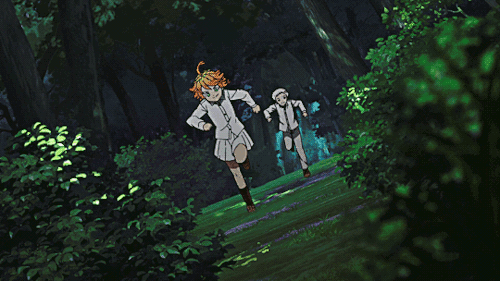
Surrounded by a forest and a gated entrance, the Grace Field House is inhabited by orphans happily living together as one big family, looked after by their "Mama," Isabella. Although they are required to take tests daily, the children are free to spend their time as they see fit, usually playing outside, as long as they do not venture too far from the orphanage—a rule they are expected to follow no matter what. However, all good times must come to an end, as every few months, a child is adopted and sent to live with their new family... never to be heard from again.
However, the three oldest siblings have their suspicions about what is actually happening at the orphanage, and they are about to discover the cruel fate that awaits the children living at Grace Field, including the twisted nature of their beloved Mama.
Zombieland Saga (2018)
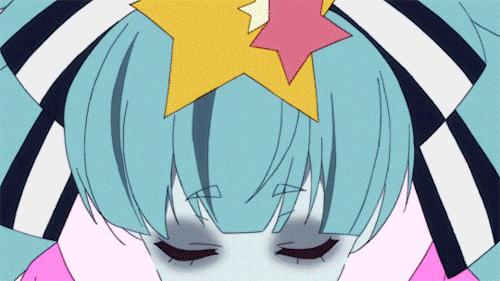
There’s a good chance you might have heard or seen this one floating around tumblr as its one of the really big, really popular anime to have come out that features a trans main character written and presented in a positive light.
Zombieland Saga is both a satirical parody of Idol anime, a complete embracing of what makes idol anime enjoyable, and a criticism of how the Idol industry treat women and young girls. A lot of the girls in the idol group are the complete opposite of what is considered a “good Idol” from one girl being trans, one girl having been an Oiran many many years ago (a historic proffession for women where they play instruments, perform tea ceremonies and entertain paying guests. As well as being very high class prostitutes) as well as debating and comparing the ideal of an Idol as they were seen in the 80s versus the modern interpretation.
Zombieland Saga is at both times the complete antithesis of everything an Idol anime should be, while also being one of the best examples of the genre at the same time. It also features really well written characters with emotional depth and arcs to them and boasts a lot of good humour to boot.
Yuru Camp△ (2018)

Another “Cute Girls Doing Cute things” anime
While the perfect getaway for most girls her age might be a fancy vacation with their loved ones, Rin Shima's ideal way of spending her days off is camping alone at the base of Mount Fuji. From pitching her tent to gathering firewood, she has always done everything by herself, and has no plans of leaving her little solitary world.
However, what starts off as one of Rin's usual camping sessions somehow ends up as a surprise get-together for two when the lost Nadeshiko Kagamihara is forced to take refuge at her campsite. Originally intending to see the picturesque view of Mount Fuji for herself, Nadeshiko's plans are disrupted when she ends up falling asleep partway to her destination. Alone and with no other choice, she seeks help from the only other person nearby. Despite their hasty introductions, the two girls nevertheless enjoy the chilly night together, eating ramen and conversing while the campfire keeps them warm. And even after Nadeshiko's sister finally picks her up later that night, both girls silently ponder the possibility of another camping trip together.
Rascal Does Not Dream of Bunny Girl Senpai (2018)
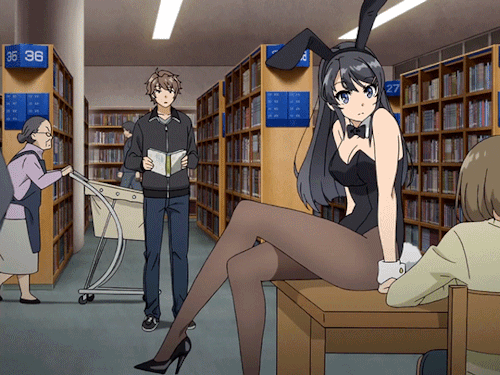
You’re gonna look at this gif and that title and think this is some Light-Novel sexy fantasy wish fullfillment bullshit, but I absolutely assure you it’s not.
The rare and inexplicable Puberty Syndrome is thought of as a myth. It is a rare disease which only affects teenagers, and its symptoms are so supernatural that hardly anyone recognizes it as a legitimate occurrence. However, high school student Sakuta Azusagawa knows from personal experience that it is very much real, and happens to be quite prevalent in his school.
Mai Sakurajima is a third-year high school student who gained fame in her youth as a child actress, but recently halted her promising career for reasons unknown to the public. With an air of unapproachability, she is well known throughout the school, but none dare interact with her—that is until Sakuta sees her wandering the library in a bunny girl costume. Despite the getup, no one seems to notice her, and after confronting her, he realizes that she is another victim of Puberty Syndrome. Mai’s unapproachability and air of not wanting to interact with people has manifested that it is now borderline impossible for people to physically notice her. Or in some cases see her at all. As Sakuta tries to help Mai through her predicament, his actions bring him into contact with more girls afflicted with the elusive disease.
Bunny Girl Senpai is an anime that deals with Societal pressures, especially as they apply to teenagers, as well as being a criticism of the Japanese mentality of “not rocking the boat” and in dutifully conforming and falling in line with what society dictates is “proper behavior”. It has the running theme that this mentality of just accepting the way things are and not doing anything to change it is unhealthy, and does more harm than good.
Dororo (2019)
(warning for violence and Gore)
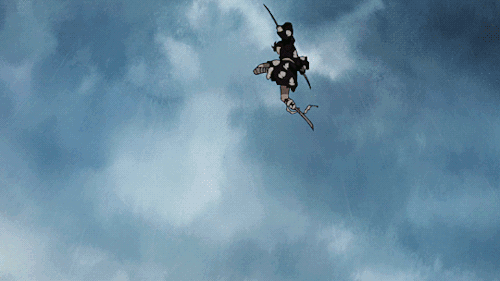
A samurai lord has bartered away his newborn son's organs to forty-eight demons in exchange for dominance on the battlefield. Yet, the abandoned infant survives thanks to a medicine man who equips him with primitive prosthetics—lethal ones with which the wronged son will use to hunt down the multitude of demons to reclaim his body one piece at a time, before confronting his father. On his journeys the young hero encounters an orphan who claims to be the greatest thief in Japan.
An anime adaptation of one of Osamu Tezuka’s manga, but deciding to go for an updated, darker art style to match its mature tone.
Dororo is currently still airing but so far reviews are extremely high.
Anyway I hope those are enough to give you at least one new show to check out.
63 notes
·
View notes
Text
Taiwanese New Wave cinema of Hou Hsiao-hsien: A City of Sadness & Flowers of Shanghai
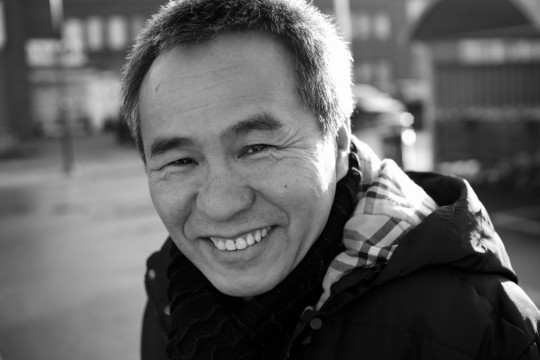
The emergence of Taiwanese New Wave in filmmaking traces back to 1982 when the young directors started working upon realistic films depicting social problems of the country. It was the last decade of the White Terror, and the directors received more freedom in their work. The most internationally acclaimed directors from Taiwanese New Wave are Edward Yang, Tsai Ming-liang and Hou Hsiao-hsien. A City of Sadness and Flowers of Shanghai are two great films representing the work, style and most important themes of Hou Hsiao-hsien. From my point of view, it is the right choice to begin with for those who would like to get down to the modern cinema of Taiwan.
A City of Sadness (悲情城市, Bēiqíng chéngshì) - 1989
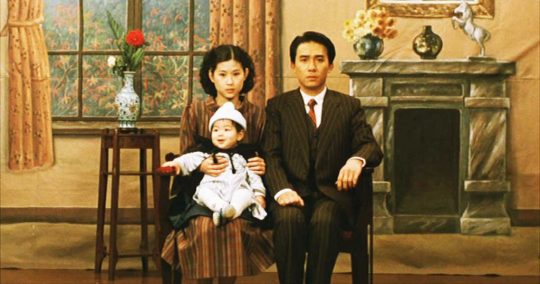
A City of Sadness is an epic historical Taiwanese drama, the first film to deal with the events of so-called Incident 228 and White Terror. The 1989 Golden Lion-winning film A City of Sadness might be a bit difficult to follow unless the viewers know a few facts behind the historical events depicted on the screen. Incident 228 is the crucial and dramatic episode of the Taiwanese history, which is almost as painful and traumatic for Taiwanese history as Nanjing massacre (if there is anything in this world to compare with those events) for the Chinese history. The incident took place on the 28th of February 1947. At this time, the Republic of China was practically part of China as it has been handed to China after the unconditional surrender of Japan ending long-lasting Japanese rule in Taiwan. While the Kuomintang party was still involved in the civil war on the mainland, the uprising had started in Taipei. It has been triggered on 28 February and was brutally repelled by the Kuomintang governmental forces of Chen Yi. The estimated death toll was about 5000-30000. The martial law has been introduced to last for the next 40 years till 1987. Before lifting the martial law, the topic of 40-years of the supreme power of Kuomintang and White Terror was taboo sort of thing for filmmakers. The film of Hou casts light on those contradictory events taking place in the Republic of China.
It is obvious that the director had to stay out of strong political criticism making the film, as it was still 1989. He tries to show the White Terror in a neutral way giving an example of the life of one extended family. He shows the family in the 1940s covering several years and jumping from older events to the subsequent years. Zhang Yimou would later make something similar related to Chinese history in his To Live (1994). While Zhang Yimou is showing the resilience of Chinese people, Hou charges his feature-length film with the fear, becoming an essential part of people's everyday life. A City of Sadness recreates the events of the 1940s where corruption was under control, and everybody could have been arrested for far-fetched accusations for bonds with guerillas or without any accusations at all. The life of The Lin family we see on the screen is destroyed by the Terror, as one brother dies at the war, the other one is assassinated, the third one suffers brain injury and the last one gets arrested.
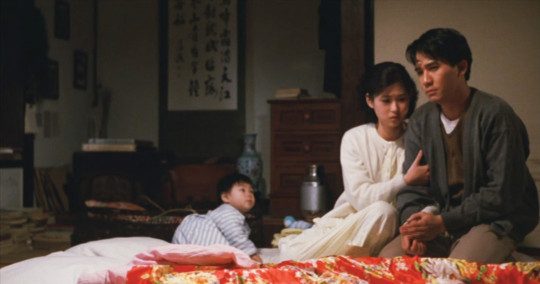
Many episodes focus at the protagonists whispering or speaking silently to show everybody is under surveillance. They are afraid of talking since you can get arrested for anything. This is probably why Hou shoots very often through the doors like somebody is always watching while people talk or ruminate. The director makes a great and ironical move introducing the protagonist Wen-ching (portrayed by Tony Leung Chiu-wai). Wen-ching is deaf-mute, and it seems like this the way one can take the things better - not hearing what is happening around and not sharing the opinion. However, Wen-ching gets arrested several times before he finally disappears in the jails. Moreover, the director uses Wen-ching to illustrate the linguistic conflict of post-war times, which was another part producing tension in Taiwan. The irony is that the dialogues in A City of Sadness are present in 5 languages and different dialects, while the protagonist is both deaf and mute to understand it.
Despite the fear and horror we observe, one can hardly say that Hou Hsiao-hsien judged those times very harshly. It is obvious, we see that the events of suppression were awful and it led many families to collapse. However, it was the price the nation had to pay to become stable. The price was certainly too high from the modern point of view, but Hou Hsiao-hsien doesn't give us a strict answer on how to take it. He only acts as a chronicler depicting the drastically important historical events of Taiwan in a perfect way, with dim colours and severe atmosphere of fear. A City of Sadness is a long thought-provoking film disclosing the establishment of Taiwanese nation after the II World War, and it is certainly worth watching, from the historical perspectives.
Flowers of Shanghai (海上花, Hai shang hua) - 1998
The theme of desperate and hopeless life of courtesans was one of the pivotal motifs for another master of the Oriental cinema Kenji Mizoguchi. The Japanese director came up with this topic in The Woman in the Rumour and Street of Shame. The courtesans of Mizoguchi don't live in poverty, yet there is no hope for better living for them. The female protagonists from the story of XIX century writer Han Bangqing are somehow similar, and Hou Hsiao-hsien employs this story for his Flowers of Shanghai screenplay.
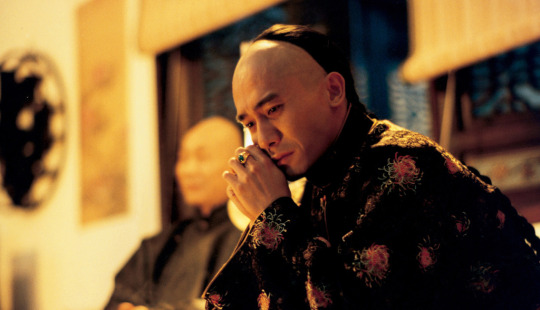
We see the scenes from several rich Shanghai brothels (or flower houses) designed for wealthy clients. These are the flower houses where only a few girls live, and they serve to the clients who spend days and hours with them again and again. The wealthy men come here to dine, gamble, smoke opium, splurge money, bring expensive gifts to the women. The houses are also used for arranged marriages. Every scene is enriched with dense colours and gorgeous decorations. The smoke of opium and gossips both courtesans and their wealthy patrons soak in this atmosphere of fake paradise. These men seemingly have forgotten about their life outside the flower houses as the scenes of the film never go beyond the brothel. The women get lots of money from the clients, but their debts also grow. We see women fading away as time goes by, and men being enthralled by the stunning allure of these courtesans, elegance of ornate ambiance and smoke of opium. The wealthy patrons illustrate drug-addled passion and emptiness of tremendous wealth, while the women act as more pragmatic characters seeking to escape their cages in the flower houses. Though they end up learning they belong there, and very of few of them would have a chance to escape, just like in Mizoguchi's films about courtesans.
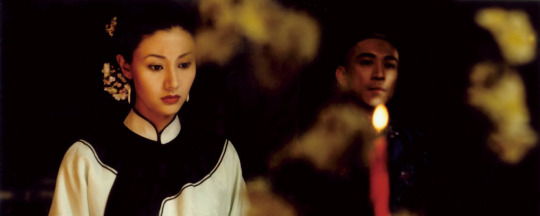
The influence of Mizoguchi can be also observed in the style Hou develops in Flowers of Shanghai. It is described by a particular way of mise-en-scèn creation and subtle beauty of slow-paced story-telling Kenji Mizoguchi was famous for. Hou enhances the film with something magnetic and mesmerizing which would be growing on the viewers after they had seen the film. This is a very atmospheric and gracious film which is shot entirely in swoon-like long takes which is another courtesy to Mizoguchi's favourite cinematic technique. The most impressive long take is probably the opening 7-minute scene at the dining table in flower house: nothing, but wonderful and artificial paradise we glance at.
To tell the stories of oppressed lives of courtesans Crimson, Jade, Emerald, Jasmine, Pearl and other girls Hou had the fantastic cast in his possession: Michiko Hada, Michelle Reis, Carina Lau, Vicky Wei. The story though revolved around wealthy patron Wang portrayed by Tony Leung Chiu-wai delivering the great performance in collaboration with Hou once again after A City of Sadness. It is spectacular to observe these tense situations the courtesans are involved in, as we see a lot of peculiarities and details of Chinese culture, customs, and traditions of the XIX century. Nevertheless, Flowers of Shanghai is the movie that preliminary draws attention with the unique and sublime aesthetics.
#hou hsiao-hsien#new wave#taiwanese new wave#a city of sadness#flowers of shanghai#Michelle Reis#carina lau#tony leung#tony leung chiu wai#侯孝贤
23 notes
·
View notes
Text
Struggling to Research Cultural Atrocities
I wanted to write a story that featured native americans in a positive light. It was set in this futuristic sci-fi alternate universe with like aliens and stuff, done to death i know but i had these native characters, and while they weren’t featured early on in the story they were to be more major later, one of them even becoming a main protagonist. i was happy with this, really happy. I knew stuff about the past and now and i decided i was going to make this a world where they had successfully taken back everything that was theirs. i wanted to portray them very positively, as strong, mighty people who were forced into hard times and had to find their way through love for their people, perseverance, and resilience.. i mean it sounded like a good idea at the time, ya know?
I’ve always been an emotionally sensitive person. I’m softhearted, okay? I just can’t do this. And now ever time i look at or think of my characters, i just think of that stuff, and it’s ruined them for me. it’s ruined everything. maybe i should be stronger i don’t know, but it’s hard to be strong with the idea of of… THAT.
This submission has been cut because it contains a lot of self-centric language, which will put a high emotional labour burden on our Native and PoC readers. If you feel that way researching our history, imagine how we feel living our history.
That being said, this concern is a legitimate one, so we’re addressing it. Any future questions along these lines will be directed to this question.
Breaking this down in two major parts:
How To Research
Brace yourself.
If you imagine history as the general worst case scenario, you’ll be generally in the right mindset. You have to remember we’re at 1% of our former numbers. You have to remember there was an active effort to erase our connection to our culture. This means a lot of death. This means a lot of war crimes. This means a lot of administrative coverups. This means genocide. Four centuries of it.
It will not be pretty.
Once you’ve steeled yourself for the fact this will be bad, stick to generalities unless necessary. No, you don’t need to research the exact body count and gory details of illnesses. You need to learn broad tactics that were used in genocide, and you can lock the door on diving in too deep.
The only time you’re really going to need specifics is for individual character backstories, to know what sort of wounds the culture would have carried. Again, you can stick with summarized accounts.
This goes for any type of nastiness in any background. Black, Jewish, East Asian, South Asian, Muslim— there’s something in every group. So long as they’re marginalized somewhere, it can get terrible.
How To Gain Hope Back
Look for resistance efforts and lift them up. Idle No More, NoDLAP, SaveTheInlet. Those three are good starting places for Native issues, and show we will not die. We might have had genocide, but that will not kill us.
Because in the end, we are still here. Every people who has been killed and had active efforts against them is still here. No matter what horror has happened, there are resistance efforts.
You can also add to the voices of lifting people up. Have Natives reclaim their land. Have Wakanda. These idealistic worlds exist because somebody said “hey, we want to imagine a paradise where these people grew strong.”
Be careful not to speak over those in the group, of course. A white person creating Wakanda would be out of place. But you can ask us what our paradise would look like and respect its existence. You can learn about how stories in there would look like and write Black people being Black and displaying their African culture proudly.
In the end
You can’t isolate yourself from the fact these painful things happened.
The dominant group needs to realize these sorts of systems are in place and are still actively oppressing others. You can take breaks, you can surround yourself with fluffy things, but if you completely shut it off with “that only happens out there”, then you end up complicit.
No, you don’t have to go out and be an activist. But you need to know the basics in respecting us, which starts with recognizing marginalization is a two way street. If the dominant group doesn’t start to dismantle its internal mechanisms, marginalization will continue.
Ignorance is supremacy’s biggest weapon, followed by fear. The dominant group wants you to be too afraid to look into this, because so long as you are too afraid to break ignorance, you do not know when or how to resist its efforts in continuing to oppress those people who you already over-empathize with.
You can use your own pain to help us ease ours. Because in the end, that pain comes from helplessness. That pain comes from not knowing how to stop it, not knowing how to help others.
You can learn how to help us.
Only then will all our pain stop.
~ Mod Lesya
497 notes
·
View notes
Text
Candyman: How Bernard Rose and Clive Barker created the horror classic
https://ift.tt/eA8V8J
In the winter of 1992, one word was enough to send a chill down the spine of horror fans far and wide: Candyman.
Released in October of that year, Candyman was a slasher movie with a killer hook – quite literally. A horror movie built around an urban legend claiming that if you say the word “Candyman” five times into a mirror, a murderous spirit with a hook for a hand would appear, with grave consequences for those who summoned him.
In a time before the internet and social media, the original Candyman’s lore was enough to spark discussion among curious moviegoers who asked each other: would you say the potentially deadly incantation?
It was a talking point the movie’s marketing leaned heavily into with taglines like “We dare you to say his name five times!” and “Candyman, Candyman, Candyman, Candyman… Don’t Say Again!”
Director Bernard Rose took inspiration for the idea from the urban legend of Bloody Mary, rather than the Clive Barker short story “The Forbidden,” which Candyman was adapted from.
According to the legend, Bloody Mary’s spectre could be summoned by chanting her name repeatedly into a mirror. One of Rose’s masterstrokes was to assimilate this folklore into the Candyman mythology, although it was not without its teething problems.
“In the original script, they were supposed to say Candyman 13 times, not five times, because in the Bloody Mary legend they say it 13 times,” Rose tells Den of Geek. “During the first read through they started going ‘Candyman, Candyman…’ and I was falling asleep. You can’t do it 13 times. It goes on too long. Five is about the largest number you can hear. It did come from Bloody Mary but I had seen Beetlejuice, so I’d have to say Beetlejuice should probably get some credit.”
Rose first hit upon the idea of adapting “The Forbidden” after he was approached about making a film out of another story from Barker’s lauded Books of Blood anthology, “In the Flesh.” But that story wasn’t quite suited to a cinematic adaptation.
“I thought it was really well written, but impossible to make because it’s about two prisoners in complete darkness in a cell,” he says. “And of course, the one thing you can’t represent in a movie is darkness, because if you are in a movie theater there’s nothing to see. It would make a great radio play but wasn’t really a great idea for a movie.”
It was during his initial research into the Books of Blood that Rose read “The Forbidden,” Barker’s short story about a university student who, while studying and photographing graffiti at a local housing estate, learns from locals about a string of murders attributed to a mythical killer known as Candyman.
A rising star at the time, Rose had already collaborated with Jim Henson on The Muppet Show and The Dark Crystal, as well as directing iconic music videos like the S&M themed promo for Frankie Goes To Hollywood’s “Relax,” which ended up being banned by MTV. His debut feature, the dream-like dark fantasy horror Paperhouse, had been released to widespread acclaim opening up a wealth of possibilities when it came to his next film.
Rose was immediately struck by Barker’s story and the way it played on “the idea of belief.”
“All of these people believe in the Candyman, which actually means the Candyman exists, whereas if they stop believing in him he disappears, like how the old deities, like the Roman gods, died because people stopped caring. The idea that if enough people believe something, they manifest it. That’s scary.”
By the time he read “The Forbidden,” Rose had already struck up a friendship with Barker, who he met at Pinewood Studios while the latter was working on Nightbreed, the follow-up to his wildly successful directorial debut Hellraiser.
It was a match made in heaven – or maybe that should be hell – and a bond that made securing the rights to the short story that would become Candyman “really easy” according to Rose, who simply called Barker up with the author agreeing to sign off on the deal and sign on as executive producer.
Rose credits Professor Jan Harold Brunvand’s book The Vanishing Hitchhiker as a major inspiration to his script. A folklore scholar, Brunvand’s book explored the origins of several notable urban legends and has been widely credited with igniting America’s obsession with the phenomenon.
“The whole urban legends thing hadn’t actually been addressed in a movie at that point, which is kind of extraordinary when you think about it,” Rose says. “It helped give the film this intellectual aspect, the idea of having an intellectual elite character studying the myth not from a sociological point of view, but from a semiotics point of view. Somebody who was intellectual and therefore naturally skeptical about something supernatural.”
While some authors have been known to be especially protective of their source material when it comes to adaptation, Rose recalls Barker encouraging him to “run free with it.”
“He liked the script very much. He was very behind it and at certain key moments, as much as anything, he was an enthusiast. Clive is wonderful. A really nice, smart guy.”
One thing they agreed on was that the story would need to be relocated from its original setting in Liverpool, England, for a very specific reason.
“At the time within genre films, there was there was a real problem with people understanding regional accents, and Clive had that problem on Hellraiser where they ended up having to loop (ADR) the whole movie and change it into a sort of weird unspecific setting, when it’s clearly some market town outside London,” he says. “If we were starting the film now, unquestionably we would have done it in Liverpool. It’s funny, things change, but back then, we wanted it to be somewhere specific. So I said, let’s make it specifically American. That seemed like the easiest thing to do.”
Rose hit upon the idea of setting the film in Chicago after noting similarities in the public housing found there and in the story’s original Liverpool setting.
The Illinois Film Commission took Rose on a tour of the city’s most troubled neighborhoods, which included Cabrini Green. “It wasn’t the worst place they showed us by any means, the Robert Taylor Homes on the South Side but Cabrini Green was right by downtown Chicago and was just spectacular.”
Rose recalls first being taken there in the company of a “full police escort.” Eager to see the neighborhood from a different perspective, he returned later on his own and befriended somebody who lived there.
“That’s the woman who the character of Anne Marie [the single mother who helps Helen with her investigation and whose infant son Anthony ends up being abducted by the Candyman] is based on,” Rose says.
Another crucial step in the development of Candyman came when the filmmaker began researching the history of Cabrini Green.
“I discovered old articles in the Chicago Reader about a series of murders that happened in Cabrini Green, including one where the killer came into the apartment through the medicine cabinet through a breeze block.”
One such article, by Steve Bogira, detailed the killing of 52-year-old Ruthie McCoy, whose pleas to a 911 caller explaining that intruders were breaking in through her bathroom cabinet went ignored.
“There was a weak spot that you could actually get into people’s medicine cabinets, which is basically inserting holes in the breeze block and you can just literally punch them out and get into somebody’s apartment.”
These articles ended up featuring in the film for real, during the scene where Helen (Virginia Madsen) began researching the Candyman myth. Another element that rang true to life was the fact that the nearby Sandburg Village was “architecturally identical” to Cabrini Green with the only difference being that the former was turned into condos while the latter became public housing. These elements all combined to inform Candyman’s biggest departure from the original short story: Candyman would be Black.
“I wanted to make the film grounded in reality and the whole racial subtext of the film came out of that,” he says. “It wasn’t part of the original story. That was about politics and class differences. The racial element was added to it by the specificity of the location.”
Rose also incorporated his own experience discovering much of this material into Helen’s narrative. “I think that’s why it still feels relevant and powerful now because it came out of something real.”
The filmmaker credits the architecture of Cabrini Green with adding a layer of dread to proceedings.
“The early 80s was the point where we were seeing how modernist architecture could really decay in the most frightening ways and be more scary than the old Gothic spaces that were always designed to be plain and simple.”
Rose felt the film offered an opportunity to draw parallels between the Candyman myth and the myths attached to life in Cabrini Green.
“There was always this kind of exaggerated fear of the place like you might get shot, which is ultimately a very powerful form of racism,” he says. “The real danger is probably very, very small unless you happen to be very unlucky.”
While the stories of murderers emerging through mirrored medicine cabinets tied into the Candyman mythology, mirrors played a wider thematic role in Rose’s film.
“The film has got a lot of mirroring in it, from the imagery to the mirrored apartment. The idea that Helen’s apartment is the same as the ones in Cabrini green. It’s just about what side of the road you are on.”
Even so, Rose refutes any suggestion of Candyman having any kind of deep agenda.
“The film was not done with a thesis in mind that I then went out to prove. It was more like I was interested in the setting we had and the story which is unchanged from the short story.”
Madsen ended up landing the role of Helen, the protagonist after Rose’s then-wife Alexandra Pigg, who had been cast in the role, was forced to drop out after discovering she was pregnant.
When it came to the Candyman himself, one rumor Rose immediately squashes is the notion that Eddie Murphy was ever considered or even interested in the part.
“If Eddie Murphy had wanted to do it in 1991, it wouldn’t have even been a discussion, it would have just happened,” he says. “Yeah, that’s not even a tiny bit true.”
Instead, Rose and the film’s producers only ever had eyes for Tony Todd.
“He pretty much just came in and was fabulous and that was that. He just had it in every sense of the word and it was pretty obvious. There wasn’t even a discussion about it.”
Securing the rights, finding a great location and landing a stellar cast had all proven relatively straightforward for Rose. One thing that definitely wasn’t straightforward, however, would be the film’s use of bees.
The film called for scenes in which Madsen would be covered in bees, while in one particularly memorable shot, the insects would be seen emerging from Todd’s mouth, as per Barker’s story, which took its inspiration from the Bible and the story of how Samson killed a young lion only to find bees and honey in its corpse. The imagery struck a chord with the author, who weaved it into the ever-expanding Candyman mythology.
Coming at a time before filmmakers could fall back on CGI, Rose was in need of an expert bee wrangler. He found one in apiarist Norman Gary.
“I saw him, he was on the Johnny Carson show playing the clarinet, covered in bees. He was quite a character,” Rose says. “He had synthesized queen bee pheromones and had hives of bees on the top of the studio and he was hatching them for the first 48 hours of their lives. Their stingers aren’t fully developed at that point so they’re not really that dangerous.”
Gary would supply the immature bees for the crucial scenes, using pheromones to have them cluster in the areas Rose required before gently vacuuming them up into a pouch when filming was complete.
Rose speaks in glowing terms about the bees themselves, describing them as “intelligent but also very predictable” which made filming the scenes somewhat pain free. Except in the most obvious sense of the word.
“Everybody got stung quite a bit and certainly when we were doing those scenes, there were quite a lot of crew members who just stopped turning up to work,” he says. “I think people didn’t want to go into a studio that was literally buzzing with bees all the time because you would get stung. I remember asking Norman ‘How do you prevent yourself from getting stung?’ and he said ‘You don’t. You just decide it doesn’t bother you.’”
Away from the sound of bees, Rose credits composer Philip Glass with delivering a pitch perfect score, that imbued the film with a sense of both the Gothic and the academically-minded analytical.
“I gave him a brief to just score it for organ, voices, and piano,” Rose says. “He loved that idea of it being very kind of minimal orchestration. So he wrote the suite basically of the music that’s in the film. I think he’s hands down the best living American composer. Very original.”
For all the praise the film and its score received, Candyman was not without its detractors including several notable Black film directors at the time.
Reginald Hudlin, who had directed Boomerang and House Party and would go on to serve as a producer on Django Unchained called it “worrisome” while fellow filmmaker Carl Franklin said the decision to made Candyman Black and move the story to Cabrini Green was “irresponsible and racist” for casting a Black man in the role of a killer.
“People were nervous before we made the film because of his ethnicity, but I always said I understand how horror villains work,” Rose says. “The bogeyman is the hero. That’s it. That’s how they function. And it’s certainly true in the case of Candyman in that Tony’s character becomes larger than the film’s other characters.”
Much of that was down to timing. “The most disappointing thing you can do in a movie is bring out the monster,” he says. “This is why The Exorcist is a masterpiece. You never see a monster. What you see is its effect on the little girl.”
In the case of the Candyman, Rose used the first half of the film to build a sense of dread tinged with a sense of tragedy with the character’s backstory which explained how he was killed in the late 19th century over his relationship with a white woman. Even as audiences catch their first glimpse of Todd in that striking leather, fur-lined coat, they are being told a story.
“The idea of the costume was to show that he was quite bourgeois, like he was on his way to the opera when he was killed. It was a reminder that he was successful and affluent yet none of that protected him.”
Rose took his cues from the Orson Welles classic The Third Man in holding back on the introduction of his titular killer.
“Every single conversation in the first half of The Third Man is about Harry Lime.” he says. “So when Orson Welles finally appears It’s one of the great entrances in film history because you’re just dying to hear what he’s got to say,”
The Candyman writer also points to an alternative reading of the film that adds a fascinating subtext to the role of race in the movie.
“It’s an entirely subjective movie told from the perspective of Helen,” Rose says. “So whatever happens in the film, it’s what she thought happened and isn’t necessarily objective. There is definitely an interpretation of the film where she committed the murders.”
The film, he says, offers up an extension of one of the original themes of Barker’s book which was the fear of poverty.
“Inequality and oppression creates fear among the oppressors, because they’re afraid of one day being called to account,” he says. “The film is about that in some ways, and that’s why it is still powerful. But I did not have any sort of agenda except to try to represent what I’d seen in Chicago as realistically as possible.”
Rose would not return for any of the sequels, with 1995’s Candyman: Farewell to the Flesh helmed by future Twilight Saga director Bill Condon. In his absence and despite the best efforts of Todd in the titular role, the franchise died out after a third film, 1999’s lamentable Candyman: Day of the Dead.
Rose puts these failures down to a mismanagement of the properties and a rush to get a follow-up out after the surprise runaway success of his film, which made $25 million from a modest $8 million budget.
“The temptation when making sequels is to just basically do the same thing again which actually doesn’t satisfy anyone,” he says. “You have to develop it and you have to make it more complex and make the story actually have a grander arc. I had ideas, but they wanted to make damn sure that they got them out of me as quickly as possible so they could get on with the serious business of fucking it up. But that’s fairly normal, unfortunately.”
However, he says he submitted a proposal for a sequel which was “pretty extreme.”
“One of the producers read it and said it was the most disgusting thing he’s ever read. All I can say about it is that it involved cannibalism and royalty.”
Though he remains coy on the finer details, he insists it would have made a “great movie” though it wouldn’t have been a straightforward sequel by any means.
“It was an expansion of the ideas in Candyman and also involved another short story of Clive’s that was actually made later by somebody else, ‘The Midnight Meat Train,’ which was set on the London Underground.”
That said, Rose remains fully supportive of Nia DaCosta’s new film, which has breathed life back into Candyman once again.
“Honestly, I think that sequel is probably better than anything I could have come up with,” he says. “It needed to be taken over by someone African-American, so it’s better that way because if I make the film again, it’s just going to be about the same thing as the first one.”
Ultimately, he feels “immense pride” at the idea that Candyman has earned a place as a horror icon to rival the likes of Michael Myers and Freddy Krueger though he sees that as “something separate to the movie in a weird way.”
cnx.cmd.push(function() { cnx({ playerId: "106e33c0-3911-473c-b599-b1426db57530", }).render("0270c398a82f44f49c23c16122516796"); });
“It was intended as a horror film, as a subjective, visceral experience. Obviously, if you write something and direct it, whatever you make is a reflection of your views on a myriad number of subjects. That’s one of the things that’s good about the film, the story is open to exploration.”
The post Candyman: How Bernard Rose and Clive Barker created the horror classic appeared first on Den of Geek.
from Den of Geek https://ift.tt/39UfRdV
0 notes